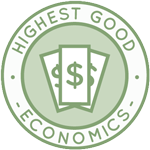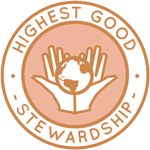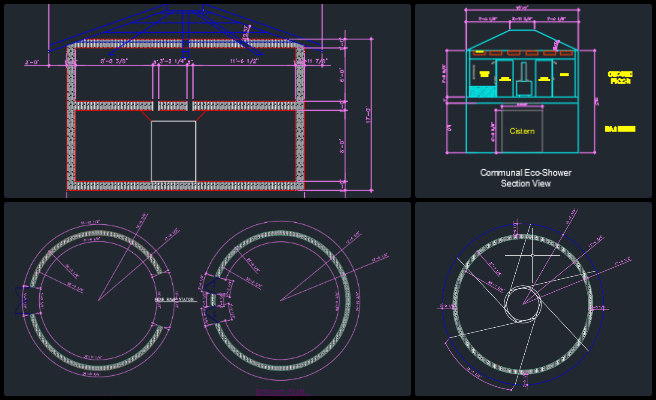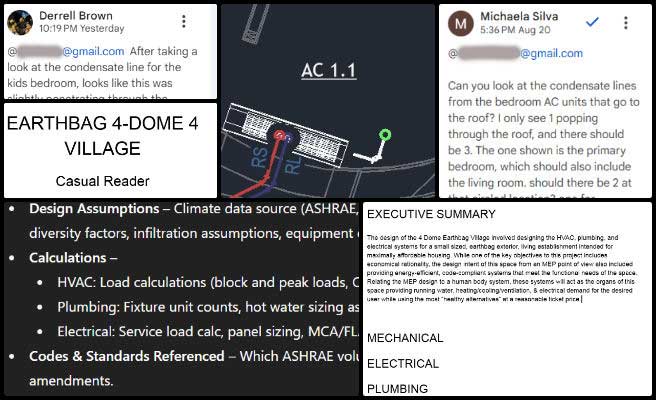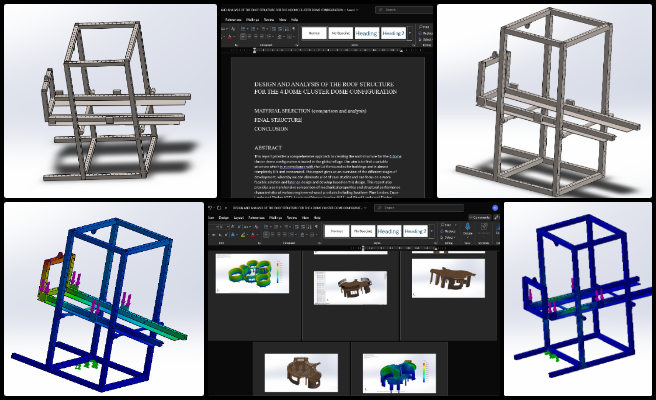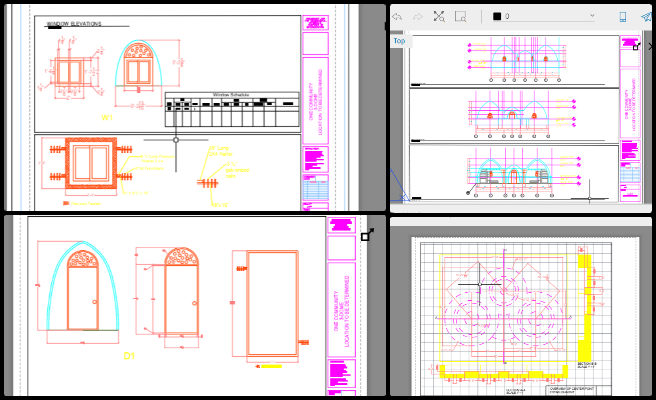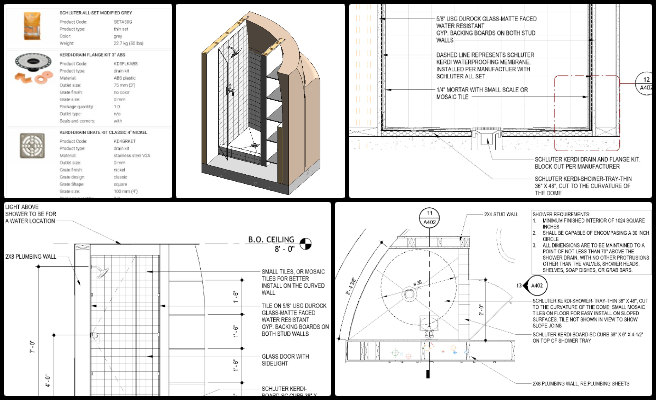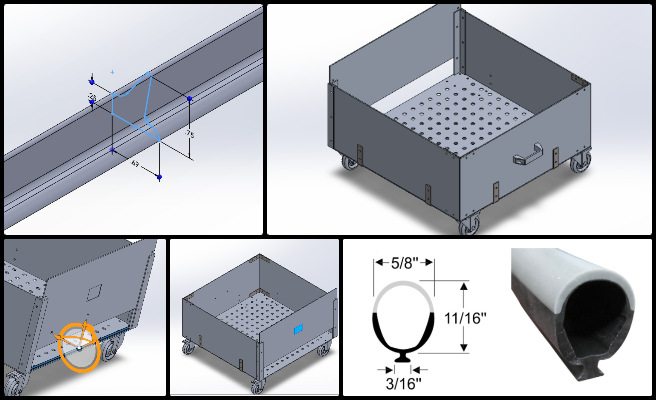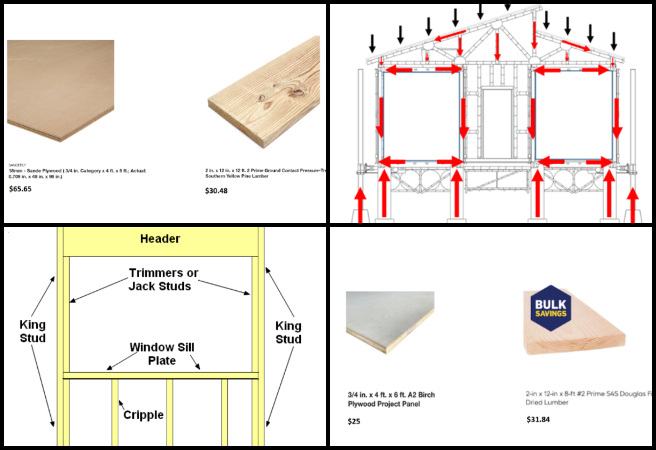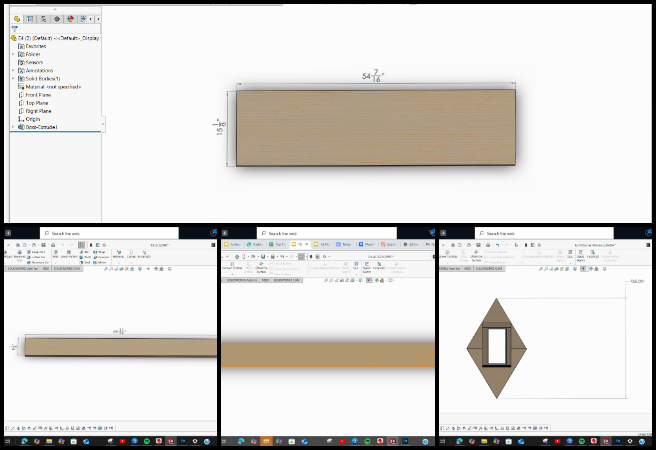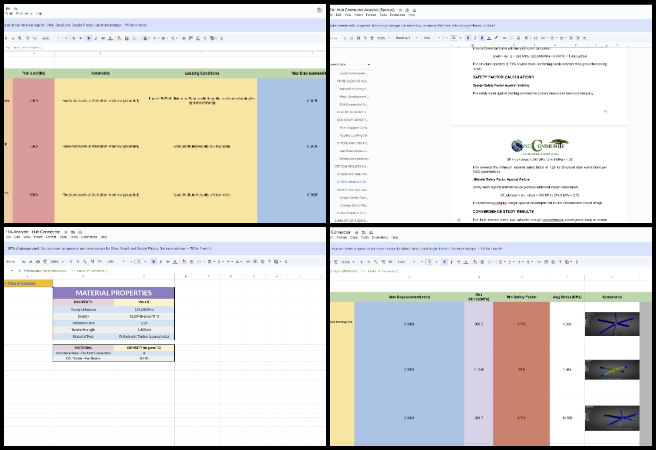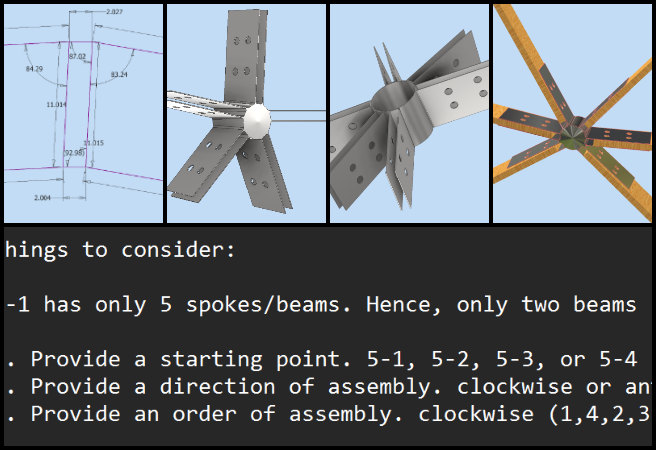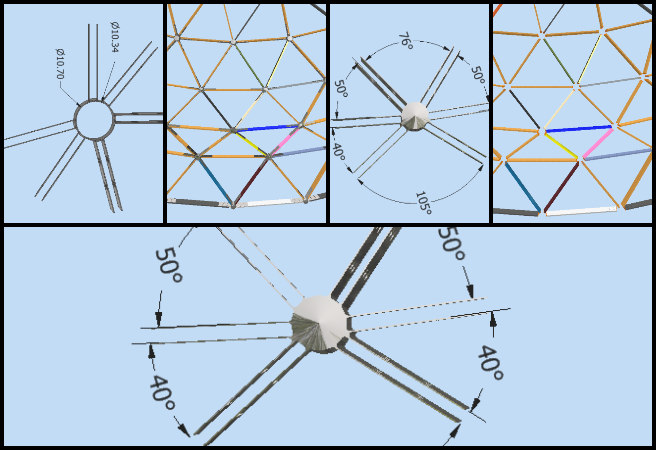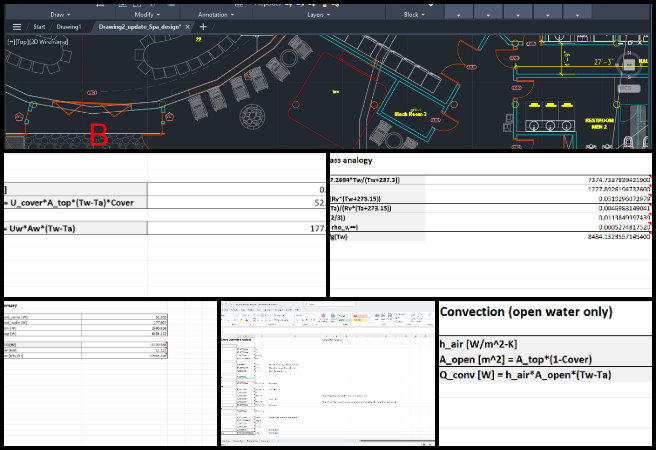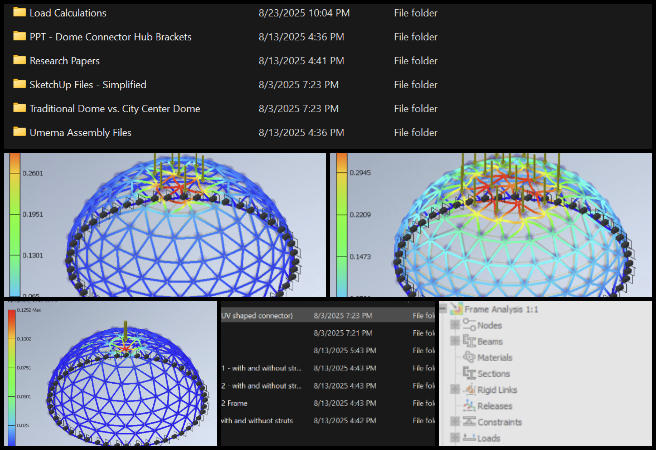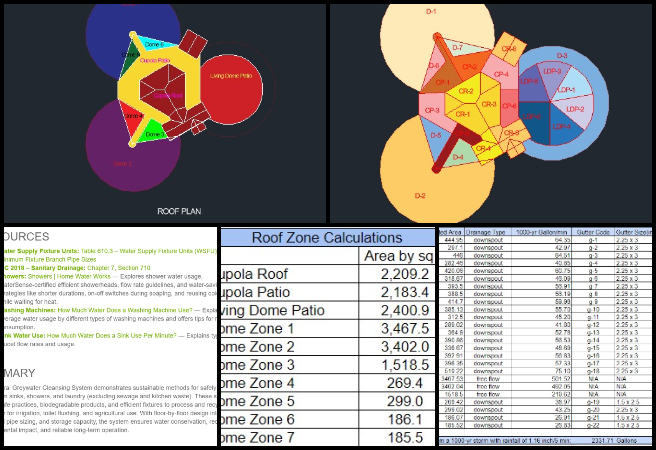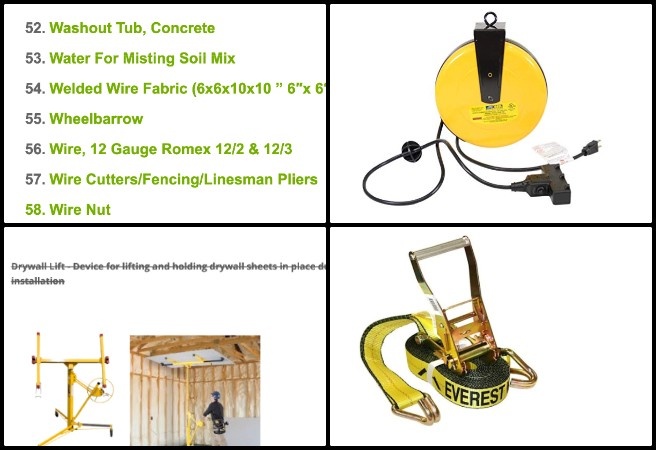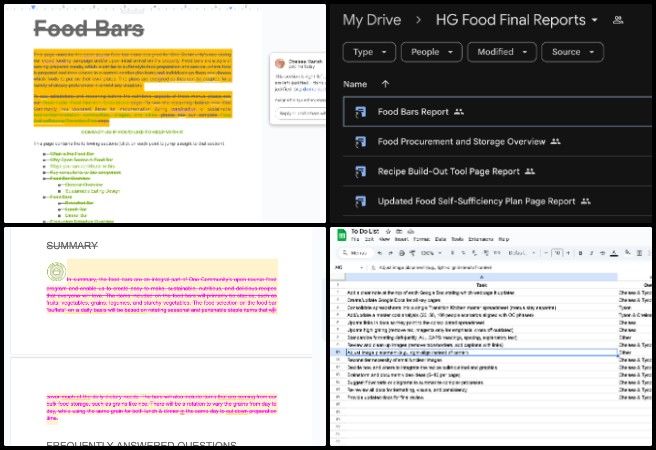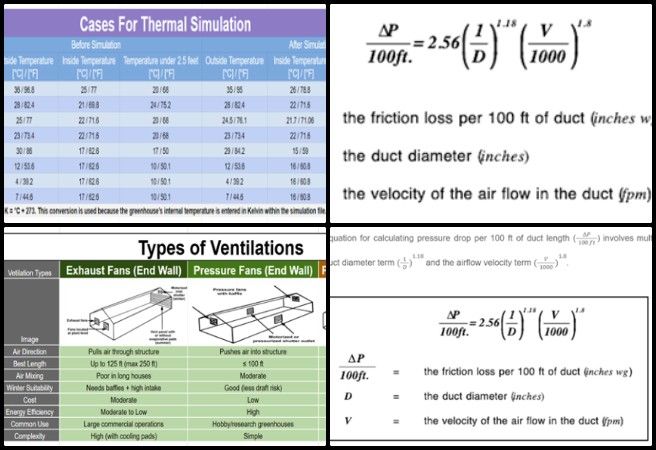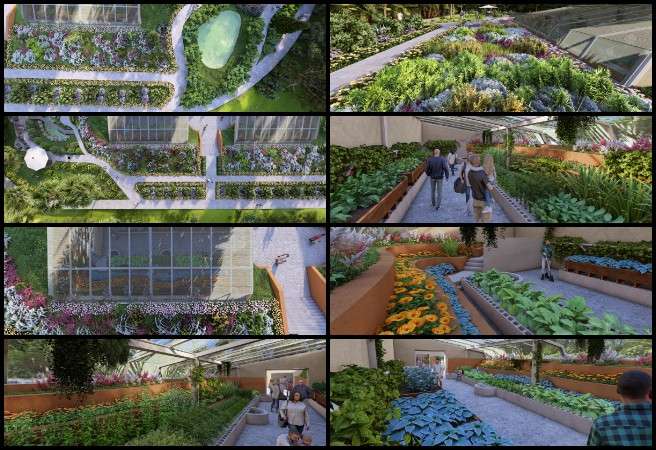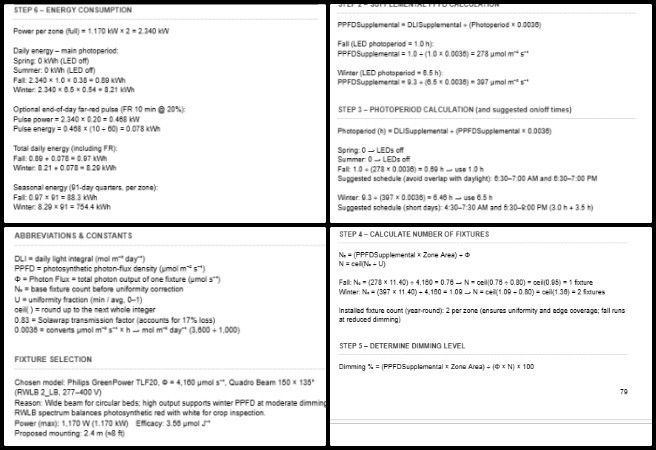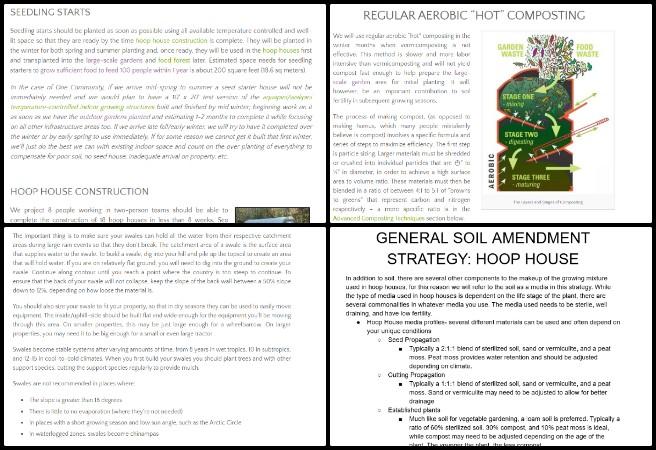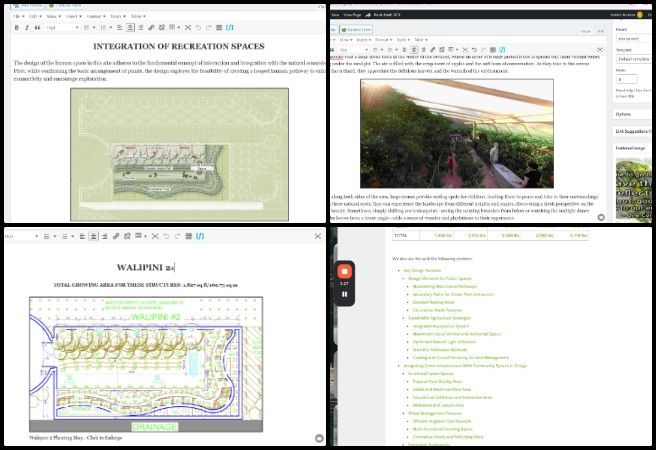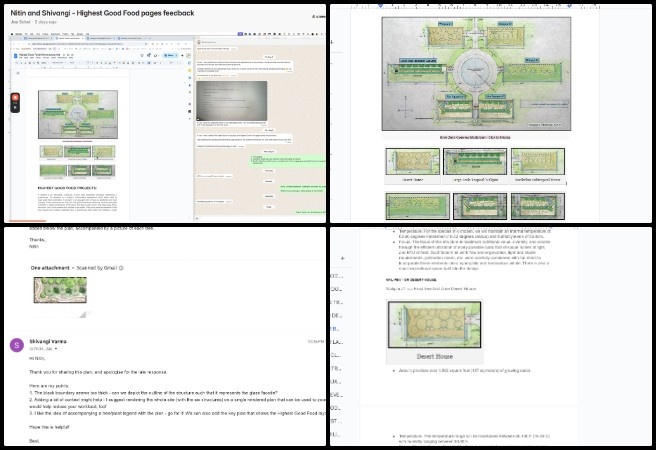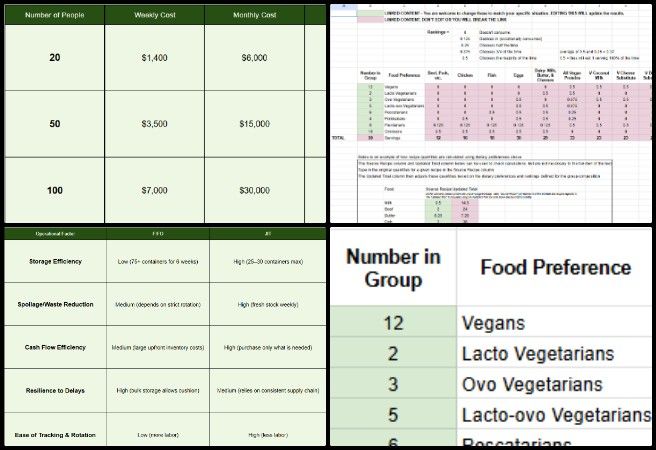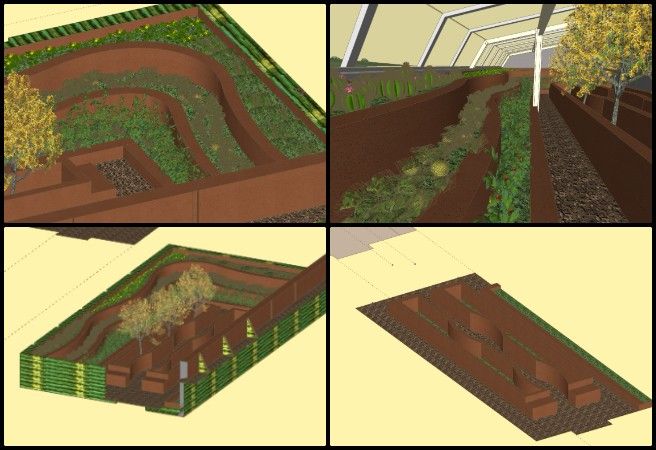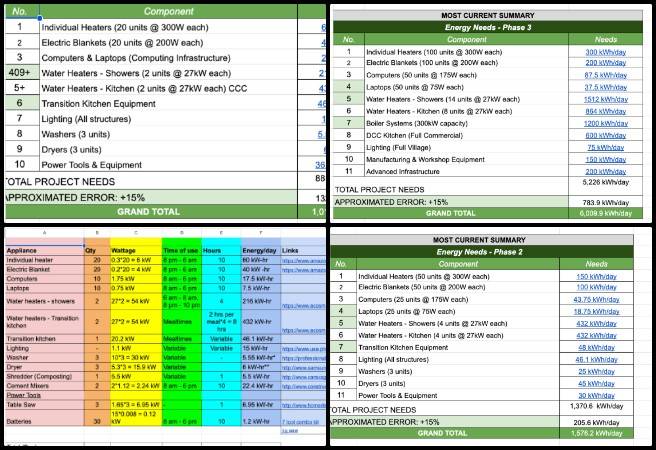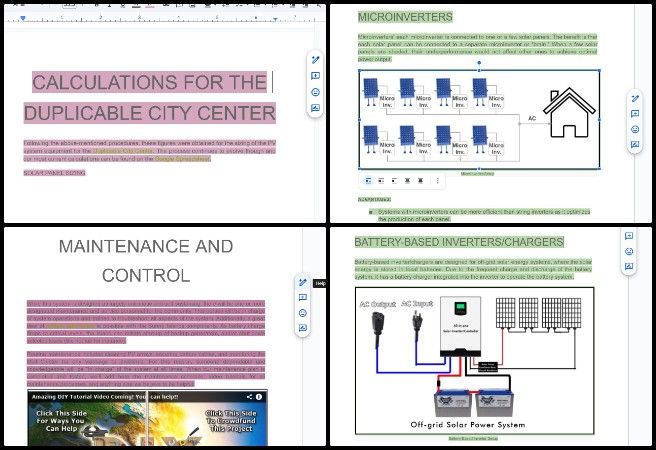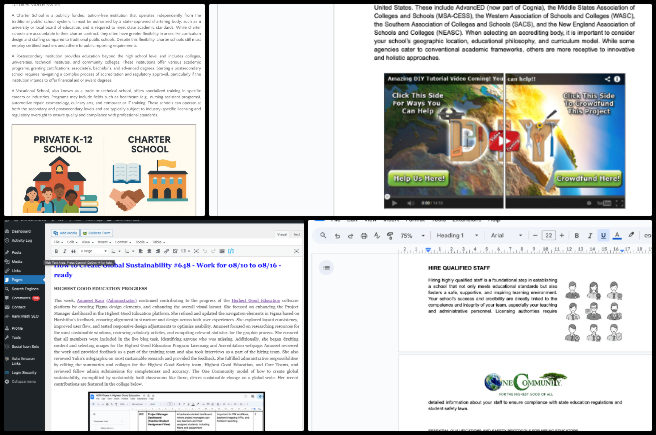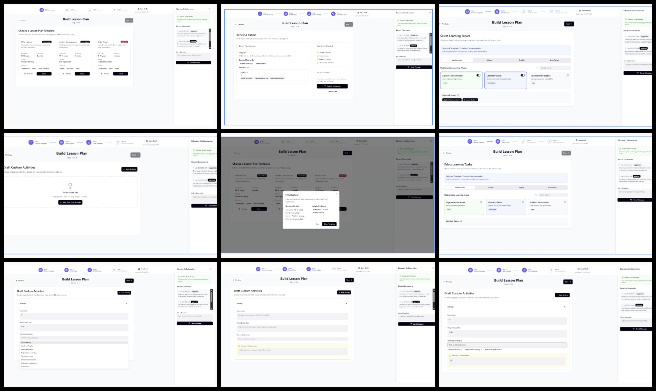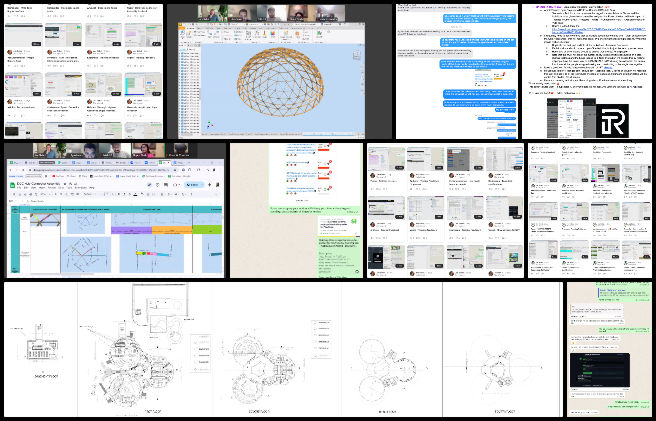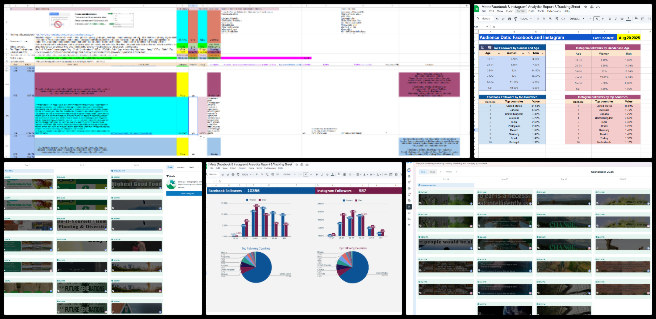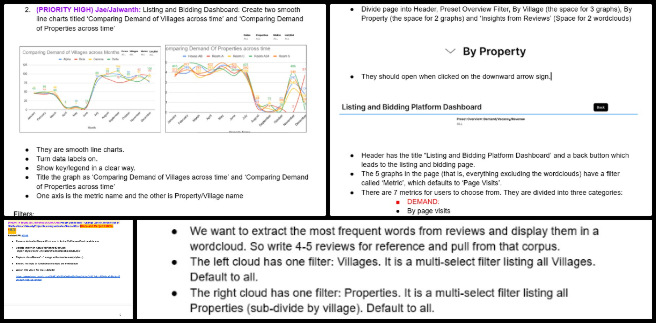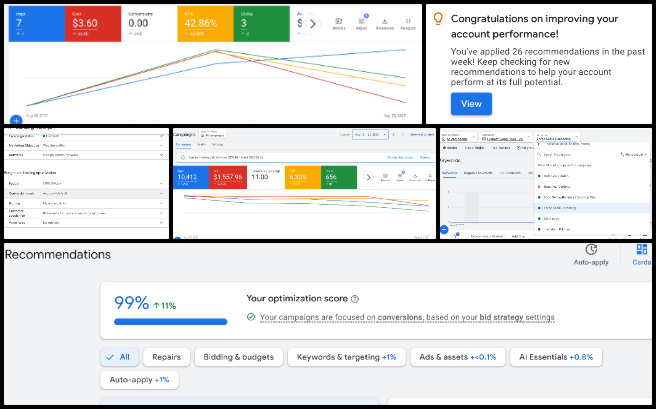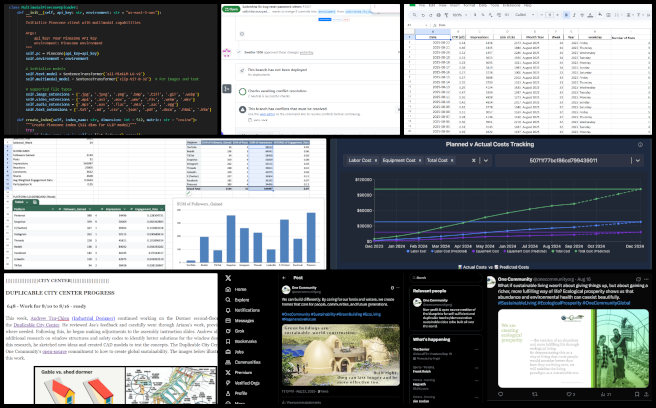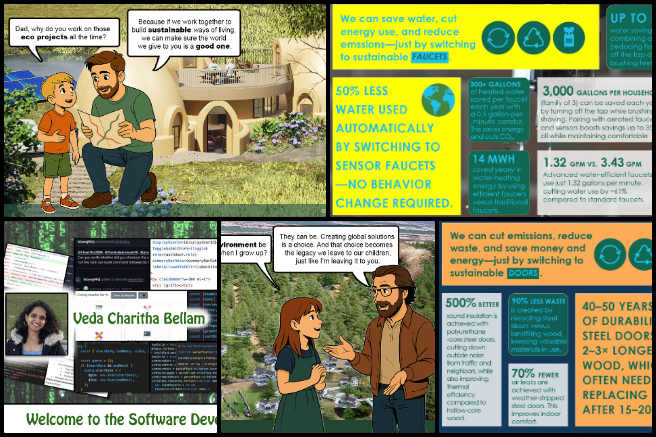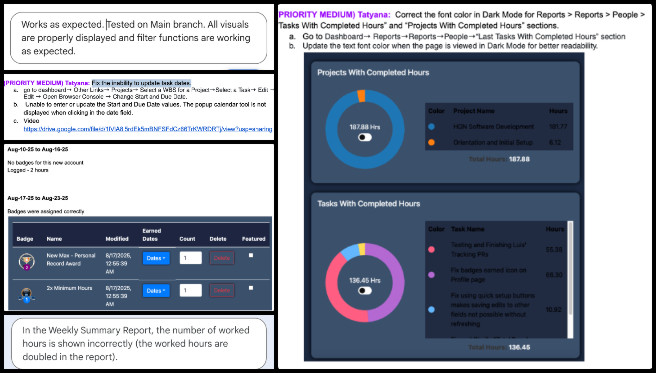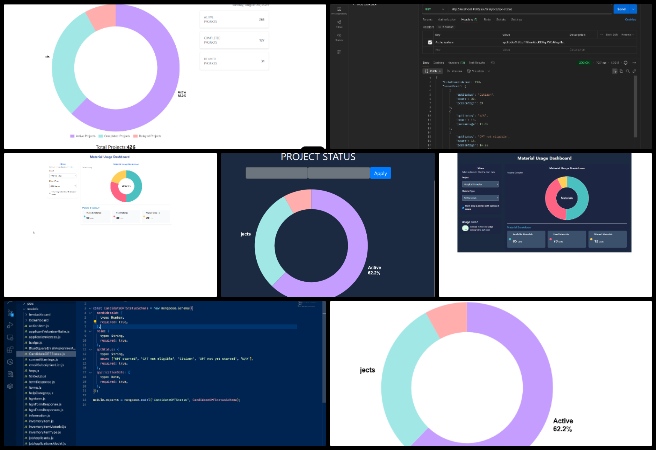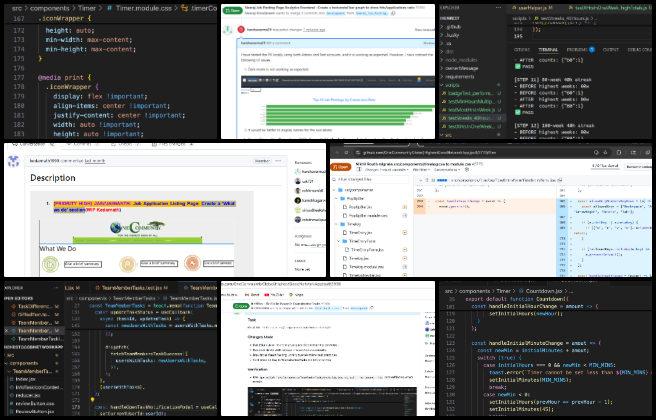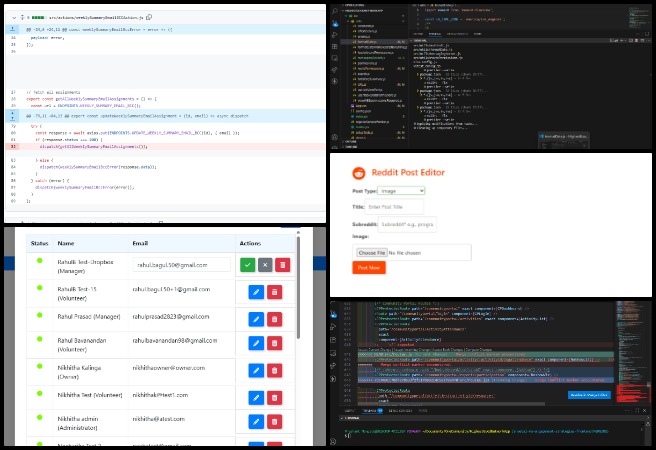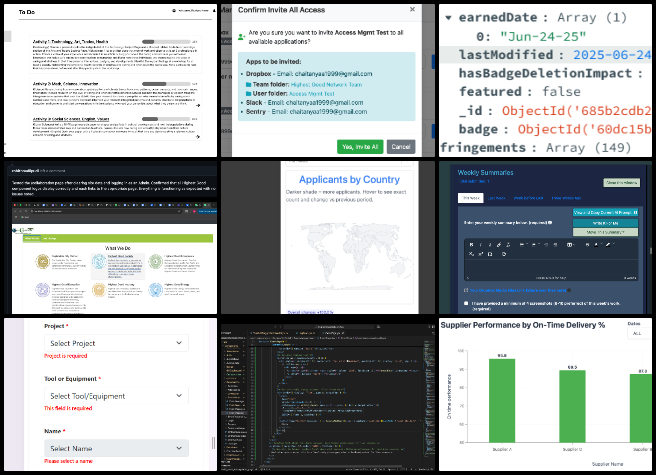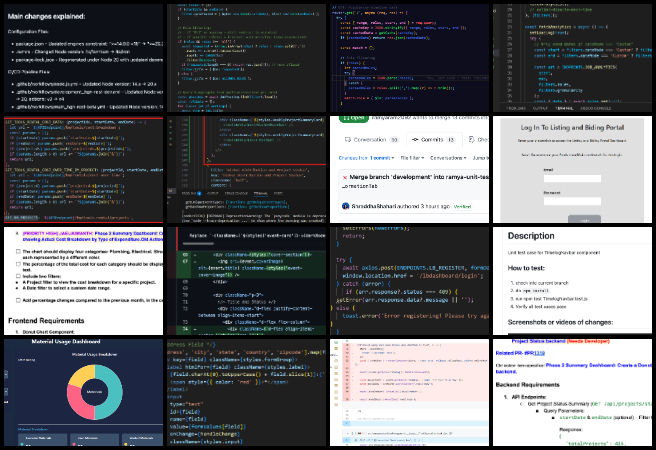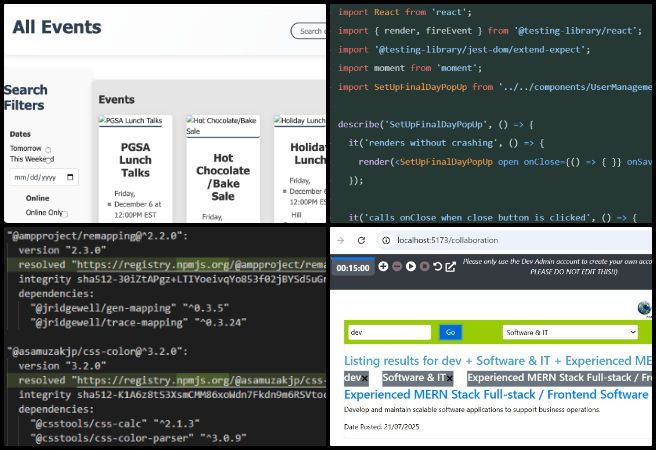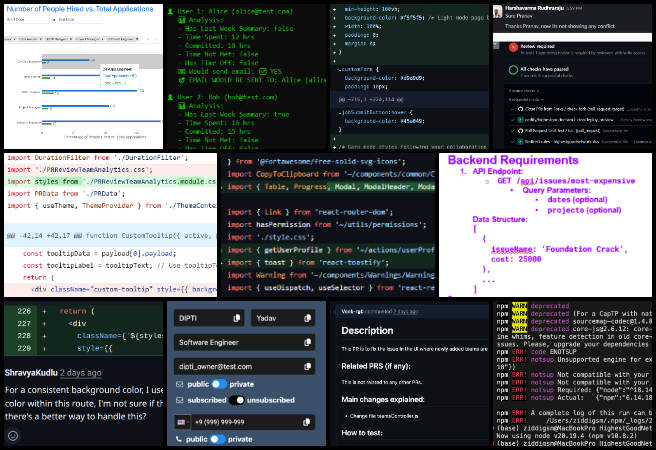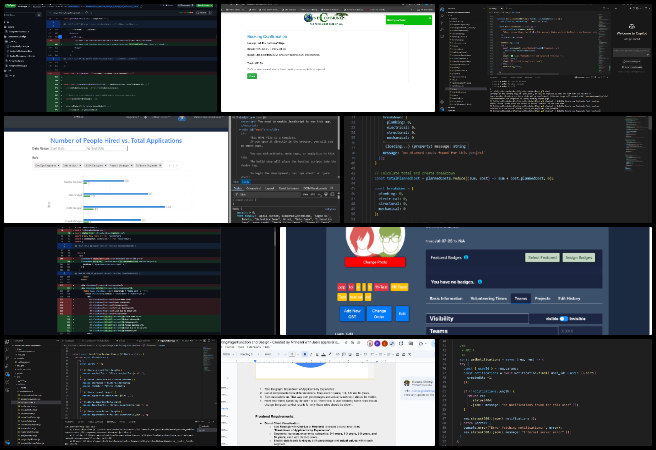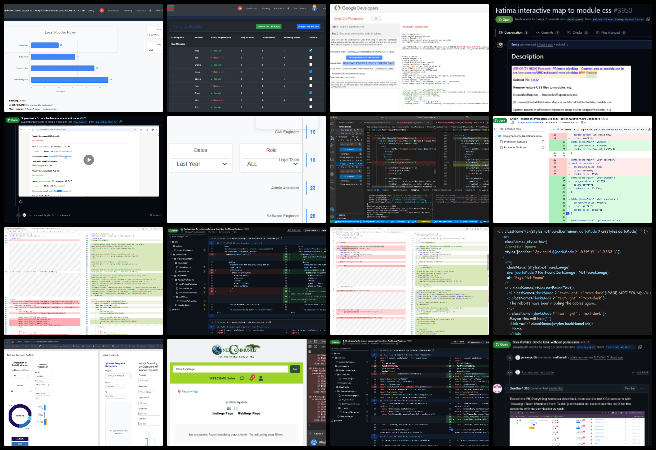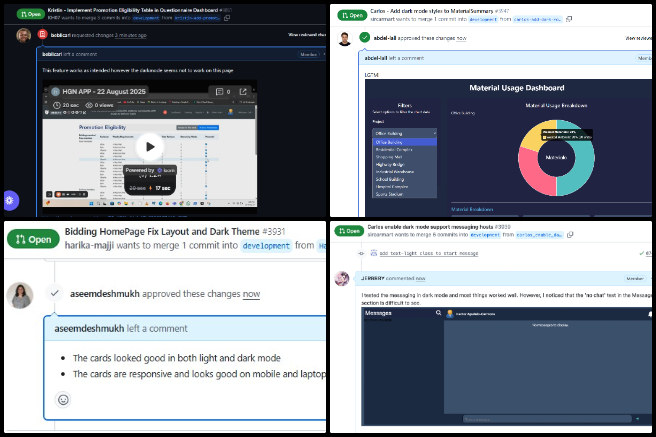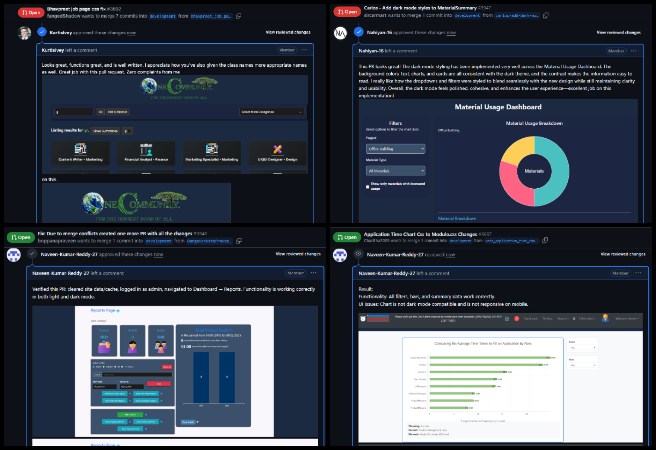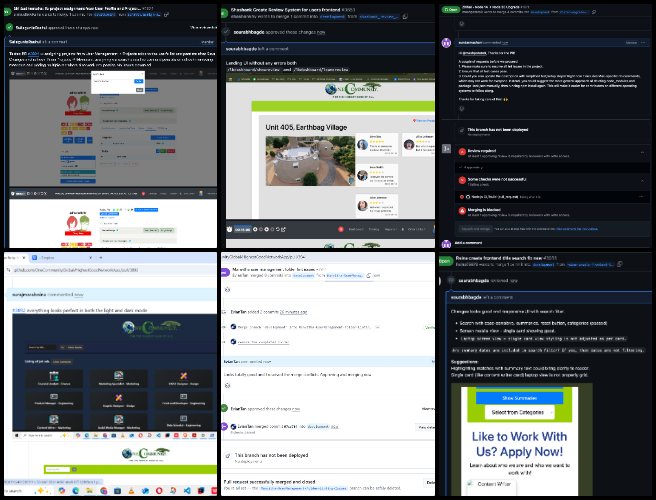Highest Good Future Building – One Community Weekly Progress Update #649
At One Community, we are shaping Highest Good future building by developing and open-sourcing a replicable model for sustainable living. This model integrates food, energy, housing, education, economics, social architecture, and more. Built entirely by an all-volunteer team, our approach is designed to support a global collaboration of teacher/demonstration hubs that regenerate our planet and promote fulfilled living. By freely sharing everything we create, we aim to evolve sustainability and expand access to solutions that work for everyone. Our mission is rooted in service to The Highest Good of All, and we invite the world to build with us.
- Here’s our project overview
- Here’s our world-change methodology
- Here’s how this becomes self-replicating
- Here’s how we are open source and free-sharing all the do-it-yourself designs
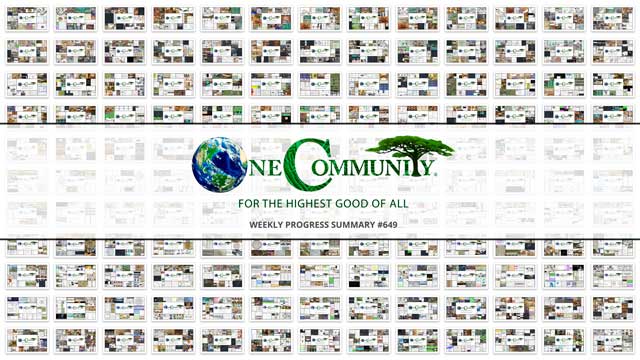
OUR MAIN OPEN SOURCE HUBS
Click on each icon to be taken to the corresponding Highest Good hub page.
One Community’s physical location will forward this movement as the first of many self-replicating teacher/demonstration communities, villages, and cities to be built around the world. This is the August 25, 2025 edition (#649) of our weekly progress update detailing our team’s development and accomplishments:
Highest Good Future Building
One Community Progress Update #649
DONATE | COLLABORATE | HELP WITH LARGE-SCALE FUNDING
CLICK HERE IF YOU’D LIKE TO RECEIVE AN EMAIL EACH WEEK WHEN WE RELEASE A NEW UPDATE
YOU CAN ALSO JOIN US THROUGH SOCIAL MEDIA
ONE COMMUNITY WEEKLY UPDATE DETAILS
HIGHEST GOOD HOUSING PROGRESS
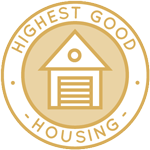 One Community is shaping highest good future building through Highest Good housing that is artistic and beautiful, more affordable, more space efficient, lasts longer, DIY buildable, and constructed with healthy and sustainable materials:
One Community is shaping highest good future building through Highest Good housing that is artistic and beautiful, more affordable, more space efficient, lasts longer, DIY buildable, and constructed with healthy and sustainable materials:
- Learn about: Our Upcoming Crowdfunding Campaign
- Learn about the different village models: 7 Sustainable Village Models
- Visit the open source portals for the first two: Earthbag Village OS Hub | Straw Bale Village OS Hub
This week, Baraka Minja (Civil and Environmental Engineer Pr. Eng.) completed his orientation. He looked through the existing drawings and started to work on the structural layouts and sections for the Vermiculture Toilet and communal shower. He drafted and updated the foundation, first floor and roof structural layouts and sections for the Vermiculture toilet and communal shower. As the first of seven planned villages, the Earthbag Village provides the initial housing within One Community’s open source designs on highest good future building. See the work in the collage below.
Derrell Brown (Plumbing Designer) continued working on the Earthbag Village 4-dome home plumbing plan details. He advanced work on the final MEP report by gathering additional background information on the Earthbag Village and its construction processes from the One Community Global website. He organized the report tailored to three audiences: a casual reader, other engineers, and individuals seeking to replicate the process. He also updated the Revit model by revising the condensate lines and removing miscellaneous fixtures. One Community’s open source launch of highest good future building begins with Earthbag Village, the first of seven planned villages providing housing. See below for some of the pictures related to this work.
Karthik Pillai (Mechanical Engineer) continued working on the Vermiculture Toilet design by making modifications to the waste dumping mechanism and running FEA analyses. Progress on the project is continuing with changes based on inputs from team meetings and the operational procedure of the mechanism. In parallel, for the Earthbag Village 4-dome cluster project, after finalizing and confirming the design, he worked on a detailed report. As the first of seven planned villages, the Earthbag Village provides the initial housing within One Community’s open source designs on highest good future building. See the work in the collage below.
Ketsia Kayembe (Civil Engineer) continued working on the three domes of the Earthbag Village and finalized the excavation foundation drawings. She organized and edited the drawings, checking dimensions to ensure accuracy. She referred to the construction template to confirm that all necessary information was included and that the standards and requirements were met. Ketsia had a meeting with Dashaarna to discuss her progress and address any questions or concerns. One Community’s open source framework on highest good future building begins with Earthbag Village, the first of seven planned villages providing housing. See below for some of the pictures related to this work.
Michaela Silva (Architect) continued working on details in the construction documents of the Earthbag Village focusing on the shower details by selecting the Schluter Shower System for the base, curb, drain, and waterproofing. She updated the shower plan and elevation to show the shower curb and the use of small-scale tiles for easier installation on the curved wall. Michaela also created a shower base section and an enlarged detail. The Earthbag Village is the first of seven villages to be built as part of One Community’s open source model on highest good future building. See her work in the collage below.
Rahul Kulkarni (Mechanical Engineer) continued working on the Vermiculture Toilet drawer design modifications. The waste dumping assembly was reviewed to evaluate its feasibility with the drawer modification. Mating definitions for the drawer assembly were resolved, and modifications were updated in the CAD model to account for the rubber seal. Building on the previous week’s work, a CAD prototype of the rubber seal was prepared and assembled into the modified drawer assembly for feasibility. The Earthbag Village, the first of seven planned villages, serves as the initial housing component within One Community’s open source model on highest good future building. See below for some of the pictures related to this work.
DUPLICABLE CITY CENTER PROGRESS
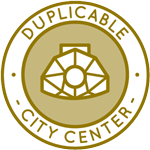 One Community is shaping highest good future building through a Duplicable and Sustainable City Center that is LEED Platinum certified/Sustainable, can feed 200 people at a time, provide laundry for over 300 people, is beautiful, spacious, and saves resources, money, and space:
One Community is shaping highest good future building through a Duplicable and Sustainable City Center that is LEED Platinum certified/Sustainable, can feed 200 people at a time, provide laundry for over 300 people, is beautiful, spacious, and saves resources, money, and space:
- Learn about this building and it’s function: Duplicable City Center Open Source Hub
This week, Andrew Tzu-Chien (Industrial Designer) continued refining the Dormer second-floor window for the Duplicable City Center. He collaborated with Ariana to review each other’s work and discussed options for selecting the most suitable wood material for the project. Together, they compared factors such as cost, ease of sourcing, kerf width, and actual thickness. During his individual work time, Andrew continued researching common practices in window framing and weight distribution to identify potential solutions for improving the existing window design. The Duplicable City Center highlights One Community’s open source commitment to the highest good future building. The images below illustrate aspects of this work.
Ariana Virginia Gutierrez Doria Medina (Industrial Designer) continued analyzing and estimating the cost of windows for the Duplicable City Center. She worked on the analysis of the material was carried out in coordination with the second-floor designer. As a result of this analysis, differences were identified between the nominal value and the actual value of the material in the 3D design. The parts were redrawn considering the actual value, and this modification affects both the final assembly and the final dimensions. The team is now awaiting final instructions and approval of the selected material in order to adjust the cost estimation. Explore the highest good future building One Community’s open source Duplicable City Center empowers people to learn. Browse the visuals below.
Ayushman Dutta (Mechanical Engineer) continued reviewing pipe materials for the Duplicable City Center hub connector design. He worked on the report formatting of the FEA analysis completed on the hub connector and created an Excel sheet documenting the results and other relevant factors. He prepared comparative analysis spreadsheets for different bolt configurations and organized visual documentation by taking screenshots of results and creating a structured Dropbox folder. Ayushman attended the weekly team meeting to discuss task bottlenecks with the team and followed up on action items, ensuring all deliverables maintained consistency with established project documentation standards. He started with another action item: a cost analysis of the hub connector design. This open source Duplicable City Center project demonstrates the highest good future building through thoughtful design. For more specifics, view the image below.
Nikhil Bharadwaj (Mechanical Engineer) continued developing the spoke designs for the Duplicable City Center hub connector. He completed the hub and spoke design for row 3 with the 10.7-inch central hub, shared the design with Nupur, and proceeded with updates to the assembly instructions spreadsheet. He created 2D spoke drawings to support cutting the sheet metal and forming the spokes for row 3. Nikhil evaluated all hub connector design variations for row 5 and set up the assembly spreadsheet, while also noting key points to consider for work beginning with row 5. He identified the need for unique assembly instructions to address variations in hub connector and beam design within the same row and planned to incorporate this approach for row 5 and subsequent levels. One Community’s Duplicable City Center is an example of the highest good future building. Here are a few pictures that showcase this work.
Nupur Shah (Mechanical Engineer) continued work on Row 2 of the Duplicable City Center hub connector. She worked on Row 3 by updating the beam designs to include cut angles on both sides, ensuring they aligned correctly with the assembly requirements. The project spreadsheet was updated to include a more detailed view, capturing the revised dimensions and part orientations. Additional updates were made to create a dedicated section for the beam view, providing clearer references for how each beam connects within the structure and improving the accuracy of documentation for ongoing work. One Community’s Duplicable City Center serves as an open source example of highest good future building. Here are a few pictures that showcase this work.
Sandesh Kumawat (Mechanical Engineer) continued refining the City Center Natural Pool and Eco-spa Designs. He reviewed AutoCAD layouts to maximize the spa pool footprint and updated dimensions in both AutoCAD and SolidWorks. Sandesh built and corrected the thermal-calculation workbook, including inputs for water/air temperatures, humidity, surface areas, and material properties. He prepared an evaporation model using the Magnus relation and heat–mass (Lewis) analogy to calculate evaporation flux, latent heat loss, and daily/monthly energy and cost with configurable COP. Clear cell comments and a Summary sheet aggregate conduction, convection, and evaporation losses. Discover the highest good future building through One Community’s open source Duplicable City Center. The following visuals illustrate highlights from this effort.
Srujan Pandya (Mechanical Engineer) continued assisting with the Duplicable City Center FEA analysis. He worked on refining the snow load analysis for the updated dome in the Duplicable City Center project. He met with Dipak to verify results, created multiple load case versions with corrected calculations, and confirmed consistency in stress test trends. Additionally, he integrated and formatted Shu’s prior snow load work, added sections showing calculations for exposure/thermal factors, and organized all project folders into a structured master archive for team access. The Duplicable City Center demonstrates the highest good future building open source design that can guide people. The images below illustrate aspects of this work.
Vineela Reddy Pippera Badguna (Mechanical Engineer) continued in-depth research on greywater reuse systems for the Duplicable City Center. She updated the report with resources and images for the greywater website and prepared images for use on the Duplicable City Center website. She reviewed the latest rainwater catchment files and analyzed optimal downspout placement. She updated the rainwater catchment drawings to align with the latest floor plans and created new zones based on recent design changes. Vineela revised the rainwater catchment zones according to the updated cupola roof, including adjustments to areas and projected rainwater collection. She updated the Living Dome Patio rainwater harvesting zones to ensure proper catchment and revised the Google Sheet with gutter sizes and slopes. She also updated the Google Sheet with gutter lengths based on calculated roof edge measurements. This open source Duplicable City Center project demonstrates the highest good future building through thoughtful design. For more specifics, view the image below.
HIGHEST GOOD FOOD PROGRESS
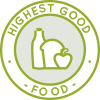 One Community is shaping highest good future building through Highest Good food that is more diverse, more nutritious, locally grown and sustainable, and part of our open source botanical garden model to support and share bio-diversity:
One Community is shaping highest good future building through Highest Good food that is more diverse, more nutritious, locally grown and sustainable, and part of our open source botanical garden model to support and share bio-diversity:
- Learn about the structures: Hoop House Hub | Aquapini & Walipini Open Source Hub
- See what we’ll be growing: Gardens & Hoop Houses | Large-scale Structures | Food Forest | TA
This week, the core team continued the final comprehensive review for the Master Tools, Equipment, and Materials/Supplies list. The review focused on identifying and correcting inconsistencies, as well as checking for accuracy in spelling, punctuation, and acronym configurations. The document is considered ready for a new reviewer or for publication on the website. The team was recommended to conduct a subsequent review after the master document has been de-cluttered to ensure accuracy without distraction. The Highest Good Food initiative is a key component of One Community’s open source plans, focused on highest good future building, and exemplifies the organization’s commitment through innovative design and implementation. Below are some images showcasing this work.
Chelsea Mariah Stellmach (Project Manager) continued her work on the Transition Food Self-sufficiency Plan menus and customization spreadsheets. She organized the task list and related documents so that she and Tyson can finalize the updates across all HG Food web pages, including Transition Kitchen, Food Self-Sufficiency Plan, Food Nutrition Calculations, Food Bars, Food Procurement & Storage, and all recipe pages. Chelsea also added feedback on Tyson’s Food Bars Report. As an essential aspect of One Community’s open source goals, the open source goals, the Highest Good Food initiative supports highest good future building as a foundation for sustainable living. Below are some images showcasing this work.
Dirgh Patel (Volunteer Mechanical Engineer) continued assisting with the Climate Battery design evolutions. He edited the final report by adding detailed explanations of equations such as the Reynolds number in its four forms for pipe flow and the duct friction loss equation for pressure drop calculations, included content on designing ventilation with heat loss and gain equations and the three types of ventilation. Dirgh revised the heating design section to incorporate heat transmission coefficients, construction U-factor multipliers, and design air change values, clarified the heating and ventilation section by adding sources and data references for equations used, and adjusted the report structure by reformatting headings and relocating the heating section along with its equations and conversions under the “Design of Heating” section. One Community’s open source mission is powerfully reflected in the Highest Good Food initiative, which is focused on the highest good future building for global benefit. The following visuals illustrate highlights from this effort.
Faeq Abu Alya (Architectural Engineer) continued his work developing house designs for the Earthbag Village 4-dome cluster project. He focused on enhancing the design of the greenhouse roof, incorporating detailed structural and material considerations. Faeq’s updates aimed to improve both the functionality and the overall aesthetic of the greenhouse while aligning with the sustainable goals of the project. The Earthbag Village is the first of seven planned villages to be constructed as part of One Community’s open source model on highest good future building. It is also powerfully reflected in the Highest Good Food initiative. Below are some pictures related to this work.
Jay Nair (BIM Designer) continued working on Aquapini and Walipini Planting and Harvesting lighting and HVAC design. Jay focused on making corrections to the Walipini Greenhouse 1 lighting energy calculation data, ensuring the content was updated and aligned with website standards. His work involved adjusting calculations, reviewing data presentation, and revising the structure so the document is consistent with established guidelines. The Highest Good Food initiative plays a leading role in One Community’s open source platform, promoting and supporting the highest good future building through sustainable and participatory development. See below for pictures related to this work.
Keerthi Reddy Gavinolla (Software Developer) continued working on the Highest Good Food page, specifically, details for the Soil Amendment page. She updated the Expressers and Lucky Star team blogs and completed her admin responsibilities for the week. Keerthi also helped Sara by sending reminders to other admins who had errors and assisted them whenever they needed help. In addition, she worked a little on the webpage edits and did some testing to ensure everything functioned properly. Built on One Community’s open source foundation, the Highest Good Food initiative is dedicated to the highest good future building, empowering communities through self-sustaining systems. View examples of her work in the pictures below.
Pallavi Deshmukh (Software Engineer) continued working on adding the new Zenapini 2 content to the Aquapini and Walipini Planting and Harvesting page. Pallavi completed and submitted information for three interviews,created new content for blog 648 and collaborated with teammates by reviewing their suggestions and incorporating feedback into a clear, consistent final version. She applied Jae’s feedback and finished adding Zenapini #2 content from Silin to the website, then moved on to Walipini #2, where she incorporated Junyi Shi’s work with updated text, links, and images for the webpage. In alignment with One Community’s open source objectives, the Highest Good Food project integrates the concept of the highest good future building into a larger vision of regenerative living. Her contributions are highlighted in the collage below.
Shivangi Varma (Volunteer Architectural Designer and Planner) continued to edit the overview of the Aquapini, Walipini, and Zenipini structures on the Highest Good Food pages based on the formatting and content feedback received and coordinated with the architect on the graphics and diagrams for the page. The Highest Good Food initiative plays a leading role in One Community’s open source platform by promoting sustainable and participatory development focused on the highest good future building. Below are visuals highlighting this work.
Tyson Denherder (Volunteer Pioneer Team Member) continued contributing to the Highest Good Food. Tyson reviewed the Food Procurement and Storage Overview, the Recipe Build-Out Tool Report, and the Off Grid vs. Grid-Tie Analysis. He received feedback on the food pages and began applying suggested changes. As part of the implementation, he started a Food Bars Report and a Vegan Rice Recipes Report and developed a cost analysis for the transition kitchen based on group sizes of 20, 50, and 100 people. The Highest Good Food initiative plays a leading role in One Community’s open source platform by promoting sustainable and participatory development focused on highest good future building. Below are images related to this project.
Gayatri Pandkar (Architect) began her work as a Volunteer Architect contributing to the Highest Good Food. She set up the time entry sheet and reviewed orientation notes and initial setup materials to become familiar with the workflow and project requirements. She then contributed to the Walipini 1 Frost-free Arid Zone Desert House project, focusing on developing and refining a SketchUp model with appropriate vegetation to reflect the design intent. As part of this process, she researched different tree species to identify SketchUp blocks that closely matched the characteristics of the selected vegetation and integrated them into the model to enhance accuracy. In addition to vegetation placement, she worked on exploring layout options that combined planting areas with designated people spaces, including seating arrangements. The Highest Good Food initiative plays a leading role in One Community’s open source platform by promoting sustainable and participatory development focused on the highest good future building. Below are visuals highlighting this work.
HIGHEST GOOD ENERGY PROGRESS
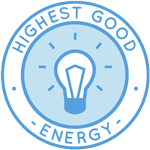 One Community is shaping highest good future building through Highest Good energy that is more sustainable, resilient, supports self-sufficiency and includes solar, wind, hydro and more:
One Community is shaping highest good future building through Highest Good energy that is more sustainable, resilient, supports self-sufficiency and includes solar, wind, hydro and more:
- Learn about the open source sustainable-energy foundations: Solar, Hydro, and Wind
- Explore our research into the most sustainable products and companies for saving water and energy: Insulation, Eco-laundry, Lightbulbs and Light Bulb Companies, Doors and Door Companies, Windows and Window Companies, Toilets, Faucets and Faucet Accessories, Urinals, and more.
This week, Dishita Jain (Data Analyst) continued her work on the HG Energy project by completing phases 1, 2, and 3 of the energy needs sheet and submitting them to Jae for review. She also addressed feedback by adding an energy tab to another sheet and linking the phases for improved structure and usability. In addition, Dishita reviewed Dashaarna’s administrative work for the OC Administration training team and provided detailed feedback on the document. One Community’s open source mission is powerfully reflected in the Highest Good Energy initiative, which advances the highest good future building as a model for global benefit. The following images showcase this work.
Shravan Murlidharan (Volunteer Electrical Engineer) continued editing and updating the Highest Good Energy webpage. His tasks included reviewing content, applying a color-coded system to highlight key information, and adding new contributions to strengthen the existing material. This work contributes to One Community’s commitment to highest good future building. He also proofread the page to improve readability, maintain accuracy, and ensure consistent formatting across sections. Daily edits built on earlier changes, steadily improving the overall structure and organization of the page. In addition, Shravan addressed comments provided by Tyson and incorporated revisions to align the content with the feedback. The focus throughout the week remained on ensuring highlighted sections matched the intended categories, refining the text for clarity, and integrating original and added information into a coherent whole. This combination of editing, proofreading, and responding to feedback helped strengthen both the clarity and alignment of the webpage content. One Community’s open source mission is powerfully reflected in the Highest Good Energy initiative, which supports highest good future building as a model for global benefit. Below are some of the images showcasing this work.
HIGHEST GOOD EDUCATION PROGRESS
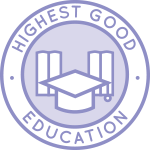 One Community is shaping highest good future building through Highest Good education that is for all ages, applicable in any environment, adaptable to individual needs, far exceeds traditional education standards, and more fun for both the teachers and the students. This component of One Community is about 95% complete with only the Open Source School Licensing and Ultimate Classroom construction and assembly details remaining to be finished. With over 8 years of work invested in the process, the sections below are all complete until we move onto the property and continue the development and open sourcing process with teachers and students – a development process that is built directly into the structure of the education program and everything else we’re creating too:
One Community is shaping highest good future building through Highest Good education that is for all ages, applicable in any environment, adaptable to individual needs, far exceeds traditional education standards, and more fun for both the teachers and the students. This component of One Community is about 95% complete with only the Open Source School Licensing and Ultimate Classroom construction and assembly details remaining to be finished. With over 8 years of work invested in the process, the sections below are all complete until we move onto the property and continue the development and open sourcing process with teachers and students – a development process that is built directly into the structure of the education program and everything else we’re creating too:
- Program Overview: Education Open Source Hub
- How the components work together in designing human orchestrated eco-abundance: How to use the Education for Life Program
- Lesson Plans for Life – Lesson Plans How-to
- Foundations of Outstanding Leaders, Teachers, and Communicators
- Curriculum for Life
- Teaching Strategies for Life
- Learning Tools and Toys for Life
- Evaluation and Evolution
This week, Anuneet Kaur (Administrator) continued contributing to the Highest Good Education software platform by creating Figma design elements and refining the overall visual layout, supporting One Community’s dedication to highest good future building. She also researched sustainable window and urinal options, reviewed scholarly articles, and compiled statistics for the graphic process. Anuneet ensured all members were included in the live blog task and flagged any absences. In addition, she began drafting content and selecting images for the Highest Good Education Program Licensing and Accreditation webpage. As part of the training team, she reviewed work and provided feedback, and as part of the hiring team, she gave interviews. Anuneet also reviewed Yulin’s infographic on sustainable research and shared feedback. Her administrative contributions included editing summaries and collages for the Highest Good Society team, Highest Good Education, and Core Teams, while reviewing fellow admins’ submissions for accuracy and completeness. The One Community model of highest good future building, exemplified by sustainably built classrooms like these, fosters lasting impact on a global scale. Her recent contributions are featured in the collage below.
Ravi Kumar Sripathi (Software Engineer) continued developing the Highest Good Education software platform by creating Figma designs and refining the Build Lesson Plan module, which enables students to transform their saved interests into weekly learning plans through guided steps. This progress aligns with One Community’s mission of highest good future building. The module lets students select from scrollable lesson plan templates, organize saved atoms from the “My Saved Interests” dashboard, and convert them into editable activity cards with names, descriptions, strategy suggestions, and collaboration notes. A summary panel then organizes all tasks by subject for educator review, supported by features such as a progress stepper, collapsible sidebar, and auto-save draft status. These updates strengthened both the functionality and user experience of the platform, advancing the One Community model of highest good future building as a path to lasting global impact. Below are images related to his work.
HIGHEST GOOD SOCIETY PROGRESS
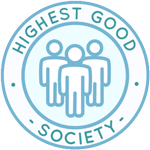 One Community is shaping highest good future building through a Highest Good society approach to living that is founded on fulfilled living, the study of meeting human needs, Community, and making a difference in the world:
One Community is shaping highest good future building through a Highest Good society approach to living that is founded on fulfilled living, the study of meeting human needs, Community, and making a difference in the world:
- Read the Highest Good society overview: Highest Good Society
- Learn about the model for fulfilled living and sharing: A Day in the Life
- Learn about the 4 economic models: RBE | For-profit | Non-profit | Entrepreneurship
- Learn about our open source community collaboration and management software: The Highest Good Network
This week, the core team completed over 50 hours managing volunteer work reviews, handling emails, overseeing social media accounts, supporting web development, identifying new bugs, integrating bug fixes for the Highest Good Network software, and interviewing and onboarding new volunteer team members. They also produced and incorporated the video above, illustrating how the highest good future building forms the foundation of One Community’s broader mission. The following images showcase highlights of this work.
Govind Sajithkumar (Project Manager) continued focusing on analytics and content management for Meta’s Facebook and Instagram channels. He managed the weekly content for these platforms by refreshing feeds with new and scheduled posts and recorded all new content details and metadata in the Open Source spreadsheet. Govind also updated the social media analytics dashboard, refreshing audience data for both platforms. Additionally, he supported PR Review Team management by updating the WordPress site with weekly summaries and collages, maintaining the PR Review Team Table, and updating the HGN PR spreadsheet. He submitted his admin feedback table, supporting One Community’s mission of highest good future building. The images below highlight key aspects of his contributions.
Jaiwanth Reddy Adavalli (Project Manager) continued developing the Job Applicants page along with key components of the Highest Good Network Phase 2 and Phase 4 dashboards, including the PR Team analytics section. He also advanced the Listing and Bidding Dashboard by designing graphs and noting related action items and tracked updates in software team management documents to continue task creation. Jaiwanth tested multiple pull requests in the Highest Good Network software and, as a member of the pull request review team, reviewed submissions from his assigned volunteers. This work supports One Community’s commitment to highest good future building. The images below highlight his contributions.
Rajrajeshwari Gangadhar Sangolli (Data Analyst) continued working on Google Ads management and strategy evolution. She paused campaigns to review metrics, tracked campaign and ad set performance using impression, click, and spend data, and optimized campaigns based on Google recommendations. Rajrajeshwari updated ad sets with images, created custom sitelinks that raised the optimization score to 97 percent, and launched new campaigns such as Highest Good Energy and Highest Good Housing. She also added new ad groups to the Highest Good food campaign, refined keywords to reduce volume and improve match quality, and adjusted bidding strategies to collect initial performance data. Additionally, Rajrajeshwari reviewed and edited submissions, incorporated images into campaigns, analyzed trends, worked on Google Ads certifications, and monitored campaign data to track early results and budget pacing. This project plays a vital role in One Community’s commitment to highest good future building. The following images highlight key aspects of her work.
ADMINISTRATION TEAM
The Administration Team’s summary, which covers their work on the Highest Good Network, was managed by Prudhvi Marpina (Machine Learning Engineer) and includes Ashutosh Mishra (Software Engineer), Dashaarna Srinivasa (Project Engineer), Divanshu Bakshi (Team Admin), Georgina George (Business Intelligence Analyst), Indra Anuraag Gade (Software Engineer and Team Administrator), Keerthana Chitturi (System Administrator), Neeharika Kamireddy (Data Analyst), Olawunmi “Ola” Ijisesan (Administrative and Management Support), Olimpia Borgohain (Data Analyst and Team Administrator), Rachna Malav (Data Analyst), Rajeshwari Bhirud (Administrator), Rishi Sundara (Quality Control Engineer and Team Administrator), Rishitha Adepu (Administrator), Sai Suraj Matta Veera Venkata (Business Data Analyst), and Samhitha Are (Administrator). The Administration Team supports the Highest Good Network, a tool designed to manage and objectively measure progress while building open source solutions for global sustainability. Through their focus on administrative support, documentation, testing, training, recruiting, and content management, the team directly contributes to highest good future building and One Community’s mission of creating a replicable model for a sustainable world.
This week, Ashutosh finalized Stage 1 documentation of the AI chatbot wireframe, onboarded Suparshwa to the project, optimized the vector database using graph node and cached augmented storage, and developed a user interface for chatbot interaction while providing feedback and publishing progress updates. This task reflects One Community’s dedication to highest good future building. Dashaarna supported Earthbag Village and Duplicable City Center by refining Blog #648 collages, updating the Work Breakdown Structure, reviewing design templates, and aligning documentation with project requirements, as well as joining the weekly coordination meeting. Divanshu advanced Phase 2 Product Management by assigning tasks, tracking follow-ups, testing HGN features, logging bugs, reviewing onboarding documentation, and initiating Mastodon analytics dashboards with key metrics and data quality checks. This work aligns with One Community’s objective of highest good future building. Georgina created a Reddit strategy to improve engagement, diversified posting formats, proposed scheduling improvements, and provided training feedback to team members. Indra compiled Blog #648, reviewed new admin training, optimized images in GIMP, created collages, performed PR testing, documented bugs through notes and video, produced AI music tracks using Suno, and drafted a structured X/Twitter playbook with strategies and workflows. Keerthana progressed in her onboarding as a new administrator by supporting training reviews and documentation while receiving feedback from senior admins. This progress demonstrates One Community’s commitment to highest good future building.
Neeharika reviewed PR dashboard items, coordinated task assignments, followed up with contributors, tested PRs, completed administrative duties, and carried out six interviews. Ola organized workspaces, created new folders for efficiency, reviewed documentation for accuracy, updated weekly files with summaries and images, and checked the HGN tracking sheet for compliance. Olimpia supported transition responsibilities by reviewing work from Teams Skye and Reactonauts, mentored a new admin (Keerthana), completed senior admin training, and resolved outstanding volunteer comments. This activity strengthens One Community’s efforts in highest good future building. Rachna focused on SEO improvements, reviewed website content, followed up on emails, and scheduled interviews for new candidates. Rajeshwari served as Blog #648 administrator, reviewing and editing summaries, providing structured feedback, updating the WordPress private blog with new content, completing the HGN questionnaire, and assisting Team Blue Steel with blog updates. This work supports One Community’s broader mission of highest good future building. Rishi merged all individual blogs into Blog #648, completed SEO work, reviewed Done and WIP PRs, labeled high-priority items, mentored new admin Keerthana, and coordinated resolution of merge conflicts. Rishitha updated bios, followed up on missing details, facilitated interviews, added hiring spreadsheet feedback, and scheduled daily social media posts while maintaining consistency on Twitter and Threads. This step contributes to One Community’s approach to highest good future building. Sai scoped the Social Media Master Dashboard by defining a cross-platform KPI schema, drafting a project proposal and task breakdown, creating proof-of-concept mockups for dashboards, and updating weekly reporting records while providing training to new admins. Finally, Samhitha balanced administration and software testing by finalizing Blog #648 with formatting and visuals, creating collages, providing training feedback, creating an administrator account for PR testing, documenting bugs, coordinating with developers, and reviewing Figma designs as part of Level 1 Phase 3 product testing. To learn more about how this work connects to highest good future building, visit the Highest Good Society and Highest Good Network pages. Some of the team’s contributions can also be seen in the collage below.
GRAPHIC DESIGN TEAM
The Graphic Design Team’s summary includes Qinyi Liu (Graphic Designer) and Yulin Li (Graphic Designer), who focused this week on creating graphic designs that support highest good future building. Qinyi worked on social media and website visuals, producing character designs, posters, a bio image for Nupur Shah, and a website announcement for Ramsundar Konety Govindarajan. Yulin contributed to graphic design, content revisions, and team communication by revising four infographics, creating three new ones, enhancing the collaboration announcement based on Sara’s feedback, managing version control on Dropbox, and participating in weekly discussions for highest good future building. Their combined efforts highlight highest good future building. See the Highest Good Society pages and the collage below for examples of their work.
HIGHEST GOOD NETWORK PROGRESS
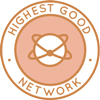 One Community is shaping highest good future building through open source Highest Good Network® software that is a web-based application for collaboration, time tracking, and objective data collection. The purpose of the Highest Good Network is to provide software for internal operations and external cooperation. It is being designed for global use in support of the different countries and communities replicating the One Community sustainable village models and related components.
One Community is shaping highest good future building through open source Highest Good Network® software that is a web-based application for collaboration, time tracking, and objective data collection. The purpose of the Highest Good Network is to provide software for internal operations and external cooperation. It is being designed for global use in support of the different countries and communities replicating the One Community sustainable village models and related components.
- Learn about our open source community collaboration and management software: The Highest Good Network
This week, the core team continued working on the Highest Good Network software pull requests and resolved several key issues. They performed HGN PR testing, confirming fixes for issues including creating a new account from the User Management page using the “Create New User” button, Tasks With Completed Hours #3564, hotfix for WBS tasks not populating #3595, resolved test cases for tasks dropdown #3597, reports projects color fix #3594, updated logic for Hide Pause and Set Final Day buttons in the Volunteer Dashboard with role-based access fix #3123, User Management UI fix #3608, addition of tooltip and stats in the legend #3560, phase 3 visualizations for no-show rate reports #3156+1277, and adding a new team form #3064. This project embodies One Community’s commitment to highest good future building.
The issue with hours logged in the Weekly Summaries Report page #1432 was not fixed, as worked hours were doubled in the report. Additionally, the team reviewed assigned badges for “Tester One,” logged 3 hours for the week with results recorded in the designated document, reported new bugs related to the inability to update task dates and incorrect font color in Dark Mode for Reports > Reports > People > “Tasks With Completed Hours” and “Project With Completed Hours” sections, and assigned tasks to two volunteers. See the Highest Good Society and Highest Good Network pages for more on how this work supports One Community’s commitment to highest good future building. The collage below highlights some of these efforts.
ALPHA SOFTWARE DEVELOPMENT TEAM
This week, the Alpha Software Team, working on the Highest Good Network software, was managed by Lin Khant Htel (Frontend Software Developer), Carlos Martinez (Full-Stack Software Developer), and Nikita Kolla (Full Stack Developer). This platform supports internal management and communication in service of highest good future building. Lin reviewed PR #1663, tested endpoints in Postman with successful results, checked weekly submissions of summaries, photos, and videos, and performed management duties for the Alpha Team. Carlos advanced the dark mode initiative by refining the messaging interface code for scalability and completing the implementation in the material usage dashboard up to the pull request stage. Nikita continued development on the Phase 2 Summary Dashboard by building the backend for the Project Status donut chart, adjusting the dark mode color scheme for consistency, and modifying the layout to display the total projects count below the chart. See the Highest Good Society and Highest Good Network pages to learn more about how this relates to highest good future building. See some of the team’s work in the collage below.
BINARY BRIGADE SOFTWARE DEVELOPMENT TEAM
The Binary Brigade Team’s summary, presenting their work on the Highest Good Network software, was managed by Nikhil Routh (Software Engineer) and included Amalesh Arivanan (Software Engineer), Ramsundar Konety Govindarajan (Software Engineer), Harika Majji (Software Engineer), Harsha Rudhraraju (Software Engineer), Kanishk Agarwal (Software Engineer), Rishitha Chirumamilla (Software Engineer), Rohit Mamidi (Software Engineer), Manvi Kishore (Software Engineer), and Taariq Mansurie (Full-Stack Developer). The Highest Good Network software is our tool for managing and objectively measuring progress, ensuring that all contributions are effectively tracked, aligned with our mission, and highest good future building.
This week, Harika worked on fixing layout and styling issues on the Bidding Page, addressing content overlap and inconsistent rendering across multiple devices by making the design responsive for tablets, iPads, laptops, and monitors, updating image scaling to adapt to screen dimensions, and adjusting dark and light mode styling. Kanishk resolved a bug that required re-submitting previously logged hours before starting the timer by reviewing the time-tracker code, reproducing the issue, and implementing new state handling to clear cached time blocks while beginning work on cross-tab synchronization; he also completed Part B of the Dashboard Bell Icon improvements and submitted PR 3932. Amalesh fixed linting errors in the Projects and SummaryManagement folders, continued progress on pull request 704, resolved merge conflicts in pull request 1480, tested the work, documented it with screenshots and videos, uploaded materials to Dropbox, tracked time with the HGN timer, and completed onboarding steps.
Manvi expanded the badge test suite to cover hour streak badges, verifying that badges were correctly added or upgraded at defined thresholds. Ram implemented a fix to correct hour totals in the Weekly Summaries Report, resolving duplicate increments in the weekly bucketing loop and submitting PR 1678. Rohit analyzed the badge system to differentiate criteria based on time progression and activity triggers, preparing for automated test strategies. Rishitha resolved lint issues in the TeamMemberTasks directory, updating 88 of 110 files to meet standards and submitting a pull request. These efforts support One Community’s focus on highest good future building.
Nikhil continued migrating legacy CSS files to CSS Modules in the TeamOrgLocations and Teams components, updating imports and className attributes, addressing compatibility issues, and reviewing PR 3864. Harshavarma worked on cleanup and completion tasks for Application Page/Function pull requests, identifying issues such as missing tooltips, invalid date handling, dark mode problems, and missing graph labels while coordinating with developers through Slack. Taariq addressed backend and frontend issues involving user counts and filterColor functionality, fixed a filters bug on refresh, resolved repository errors, debugged inactive users being included in weekly summary emails, and cleaned up the backend repository while continuing work on the weekly summary email task. See the Highest Good Society and Highest Good Network pages for more about how this relates to highest good future building. The collage below shows images of their work.
BLUE STEEL SOFTWARE DEVELOPMENT TEAM
This week, the Blue Steel Software Team, working on the Highest Good Network software, was managed by Divanshu Bakshi and includes Linh Huynh (Software Engineer) and Sheetal Mangate (Software Engineer). As part of highest good future building, Linh worked on the task linh_fix_weekly_summary_email_update, addressing issues with the admin Weekly Company Summary Email edit and save flow. He identified why changes were not reflected immediately and implemented fixes so that add, modify, and delete actions update the recipient list without delay. Linh also updated files related to weekly summary email assignment, action handling, and constants to trigger immediate UI and backend synchronization, streamlined update logic to reduce redundant calls, validated changes through local testing, and opened a pull request on the development branch. This work aligns with One Community’s objective of highest good future building. Sheetal addressed environment problems during the move to Node.js 20 by removing prior Node.js versions and Node Version Manager and rebuilding the development setup. She then worked through merge conflicts but was blocked from pushing due to failing test cases. After attempting to resolve the failures, she refocused on the auto-poster feature, making progress on cascading style sheets, UI design, and functionality for saving posts to the database. The images below highlight key aspects of their contributions.
CODE CRAFTERS SOFTWARE DEVELOPMENT TEAM
The Code Crafters Team, covering their work on the Highest Good Network software, was managed by Sai Shekhar Reddy Moola (Software Engineer) and includes Ajay Naidu (Software Engineer), Ashrita Cherlapally (Software Engineer), Benitha Sri Panchagiri (Software Engineer), Chaitanya Swaroop Kumar Allu (Software Engineer), Humera Naaz (MERN developer), Juhitha Reddy Penumalli (Software Engineer), Rohith Mallipudi (Software Engineer), Sphurthy Satish (Software Engineer). The Highest Good Network software is how we’ll manage and objectively measure our process for highest good future building through our social architecture, construction, production, and maintenance processes, and support widespread and lasting eco-lifestyle access. This effort exemplifies One Community’s open source commitment to demonstrating highest good future building as a path to global sustainability.
This week, Ajay worked on PR #3254 by addressing deprecated package issues, reinstalling updated modules, ensuring compatibility with the current development branch, creating a new branch after cloning the repository, and resolving a form data display issue by adding console output for user-entered values. This progress demonstrates One Community’s commitment to highest good future building. Ashrita worked on PR #1674 for a Country of Application map chart and PR #1516 for the backend, adding a dedicated route, an accessible color scale, hover text with counts and percentages, timeframe controls, a multi-select role filter, basic error handling, and console logs, while also creating endpoints for roles, data aggregation, and comparisons, resolving merge conflicts, updating routing, refactoring lint issues, and adjusting authentication through an Axios interceptor to align with Postman behavior. This activity strengthens One Community’s efforts in highest good future building. Benitha focused on addressing approximately 300 import errors across the project, fixing around half, and enhanced EventPage.jsx by introducing a comments feature with state for posts and replies, input handling, threaded discussions, and a note regarding future live updates requiring backend or socket integration. Chaitanya enhanced the Access Management system by implementing automation improvements for Dropbox and Sentry, adding validations, error handling, debug logging, linter compliance, and process documentation for invite and revoke tasks, while testing updates in preparation for production. This work supports One Community’s broader mission of highest good future building. Humera investigated a badge earn-date issue in PR #1193 by reproducing the behavior, reviewing date-calculation logic and configurations, verifying badge cases, comparing rules with intended behavior, and documenting observations with next steps for updating offset logic. Juhitha integrated Google Gemini AI into the Weekly Summary component through a “Write it for me” button by setting up a backend AI controller, configuring environment variables, resolving compilation issues with the sharp library on Apple Silicon, restoring and connecting the WriteForMeModal component, and debugging Node.js compatibility, React imports, and API validation, followed by end-to-end testing to confirm correct extraction, formatting, and submission of time entries to the Gemini model. This step contributes to One Community’s approach to highest good future building.
Rohith progressed on tasks from the Cleanup Task document by creating a new assignment for Namita to develop a grouped/stacked bar graph for Job Posting Page Analytics, following up with Vedha Charitha on an applicant source donut chart tied to PR #3811, reviewing PRs #3714 and #3912 related to analytics and reporting, and flagging a merge conflict in PR #3741 to Pranav for resolution. Sai Moola worked on the Supplier Performance bar graph, advancing the frontend so suppliers display with filters, fixing an issue where the filter was sourcing projects from the wrong collection, and identifying a remaining problem with the date filter that needs resolution. This project embodies One Community’s commitment to highest good future building. Sphurthy refined Deliverables 2 through 5 by aligning task assignment logic, grouping structures, prerequisite validation, and metadata with Deliverable 1, ensuring consistency across subjects, color levels, activity groups, teaching strategies, and life strategies, while also addressing backend logic for lesson plan task assignment in Deliverable 1 and troubleshooting application setup issues with Node.js version 20 after the dashboard failed to load properly. These contributions strengthen One Community’s open source mission of providing replicable solutions that model highest good future building. See below for some of the pictures related to this week’s work by the team.
DEV DYNASTY SOFTWARE DEVELOPMENT TEAM
The Dev Dynasty Team’s summary, covering their work on the Highest Good Network software, was managed by Zhifan Jia (Software Engineer) and includes Adithya Cherukuri (Volunteer Software Engineer), Deekshith Kumar Singirikonda (Developer), Dharmik Patel (Software Engineer), Manvitha Yeeli (Software Engineer), Neeraj Kondaveeti (Software Engineer), Prasanth Bhimana (Software Engineer), Shraddha Shahari (Software Engineer), Vamsi Krishna Rolla (Software Engineer), Vamsidhar Panithi (Software Engineer), and Varsha Karanam (Software Engineer). The Highest Good Network software is how we’ll manage and objectively measure our process for highest good future building through our social architecture, construction, production, and maintenance processes to support widespread and lasting eco-lifestyle access. This progress helps drive One Community’s shaping of highest good future building.
This week, Nahiyan reviewed PR3947, verifying dark mode styling for the Material Usage Dashboard. He ensured consistent updates to backgrounds, text, charts, dropdowns, filters, and cards while maintaining readability and usability. This work contributes to One Community’s commitment to highest good future building. Shraddha addressed multiple pull requests and issues. She completed PR2210 after resolving conflicts, began work on PR2266 (though some errors remain), reviewed PR3492, and fixed dark mode functionality in PR3612, which was affected by the Node 20 upgrade. Vamsi Krishna progressed on the Engagement tab and Comments section. He finalized PR3404 by resolving merge conflicts, validated organizer-specific functionality, established a reusable CSS module structure, and built routing, UI, and posting features, including interactive elements such as likes, replies, and tab-switching. Manvitha refined input handling, validation logic, layout rendering, and error messaging for the Event Registration page. She updated failing unit tests, resolved formatting and linting issues across multiple files in the User Management folder for PR3941, and addressed dark mode review comments in PR3828. This progress demonstrates One Community’s focus on highest good future building.
Prasanth contributed to Phase 2 document finalization by reviewing over 50 pages and validating multiple PRs locally. He identified issues, created action items on modular CSS and functionality gaps, collaborated with developers, coordinated updates with the manager, and suggested UI/UX improvements with Sai Charan and Varsha. Deekshith worked on the Listing and Bidding Platform, implementing registration and login flows with validation, API integration, styling, and error handling, while addressing CI/CD pipeline issues caused by missing dependencies. Adithya focused on backend and frontend tasks for Job Posting Page Analytics, cleaning older data, implementing aggregation logic for the Popularity Timeline Analytics feature, integrating with frontend visualization and filtering, resolving caching and date-handling issues, and completing a horizontal bar graph comparing average pledged months by role. Neeraj updated backend filters, developed the JobAnalyticsFilters component, integrated it with the JobAnalyticsCompetitiveRolesPage, and connected filters to JobAnalyticsGraph for consistent visualizations. Zhifan completed the Node 14 to Node 20 upgrade, resolved merge conflicts, incorporated CSS modules, fixed Prettier errors, designed a database structure for event tracking, created a grouped bar graph for injury severity, and implemented improved edit logs for Tasks. Dharmik enhanced the Application/Job Posting functionality with the QuestionSetManager, expanded frontend components, refined the Job Form Builder, and completed integration and testing. Vamsidhar resolved merge conflicts and validated functionality for PR3241 (Activity FAQ Section) and PR3405 (Registration Confirmation Modal). Varsha reviewed project requirements and backend code, fixed questionnaire form layout issues, recreated the interface in React with hooks and Tailwind CSS, and implemented interactive form controls for role suggestion. See the Highest Good Society and Highest Good Network pages for more on how this relates to shaping of highest good future building. Explore some of the team’s work in the collage below.
EXPRESSERS SOFTWARE DEVELOPMENT TEAM
The Expressers Team’s summary, which covers their work on the Highest Good Network, was managed by Rahul Trivedi (Software Engineer) and includes Casstiel Pi (Software Engineer), Meenashi Jeyanthinatha (Full-Stack Developer), and Tanmay Arora (Software Engineer).
This week, Casstiel returned from time off and continued resolving the git repository issue tied to the add href tag functionality for the Google icon. He tested different approaches, including pulling from the origin branch to align code, removing differences to clean up conflicts, and verifying whether these changes corrected the problem. In parallel, he continued development of the new auto-poster feature for the Plurk platform, confirming API calls returned expected results. Work also began on the user interface, focusing on displaying the data flow so the posting process and component interaction are clearer for users. This work aligns with One Community’s objective of highest good future building. Meenashi confirmed that both Position and Category should be implemented as dropdowns and updated the tiles to link to jobDetailsLink instead of applyLink. The reset button requirement was removed and replaced with a delete option on filter chips, allowing users to remove filters individually. Summaries were adjusted to display on a single page rather than across multiple pages, and the Position suggested by the manager was added and tested. Testing confirmed dark mode functions properly and the filter chip delete option works correctly. Improvements included modifying search results to update only after the Go button is clicked, adjusting the summaries toggle, and confirming the final layout. Questions for the manager included whether the dark mode color scheme is acceptable, how positions and categories should be managed, and whether the filter chip design is acceptable. This outcome supports One Community’s focus on highest good future building.
Rahul worked on optimizing the navigation bar by aligning it with the original main dashboard design and ensuring consistency across smaller screens. He made adjustments to meet Phase 3 requirements, finalized the implementation, and raised PR #3934 while also resolving issues with the yarn.lock file. He also managed responsibilities for the Expressers Team, reviewing summaries, photos, and videos, and providing feedback to support team progress. This activity strengthens One Community’s efforts in highest good future building. Tanmay worked on fixing a bug for the FAQ tool’s search utility. The issue involved unanswered questions being saved correctly but still triggering a failed warning on the frontend due to the email notification step when no Owner email address was configured. The fix ensured logging of unanswered questions now works independently of email notifications, preventing unnecessary warnings while still allowing notifications to Owners when email details are available. Updates involved reviewing frontend and backend code paths, adjusting how unanswered question submissions are handled, and modifying notification logic so that logging success is not impacted by email-related errors. See the Highest Good Society and Highest Good Network pages for more on how this contributed to highest good future building. See the collage below to view the team’s work.
LUCKY STAR SOFTWARE DEVELOPMENT TEAM
The Lucky Star Team’s summary, which covers their work on the Highest Good Network, was managed by Barnaboss Puli (Volunteer Software Engineer) and includes contributions from Dipti Yadav (Software Engineer), Durga Venkata Praveen Boppana (Software Engineer), Ganesh Karnati (Software Engineer), Ghouse Shahe Meera Ziddi Mohammad (Software Engineer Intern), Kedarnath Ravi Shankar Gubbi (Software Engineer), Pranav Govindaswamy (Software Developer), Shashank Madan (Software Engineer), Shravya Kudlu (Software Development Engineer), Sohail Uddin Syed (Software Engineer), Veda Bellam (Software Engineer), and Venkataramanan Venkateswaran (Software Engineer). Their work continued to support our goal of highest good future building through collaborative and cross-functional software development.
This week, Barnaboss continued work on the Twitter/X auto-poster, addressing persistent API issues, developed the Phase 2 Summary Dashboard horizontal bar graph for “Utilization Rate and Downtime of Tools/Equipment,” and contributed to the Elite Bug-fix Team by troubleshooting deadline tracking with Postman and testing network configuration changes. This work supports One Community’s broader mission of highest good future building. Additional work included resolving merge conflicts following a Node upgrade, adjusting dependencies and build files to maintain compatibility, and stabilizing builds. Dipti completed a role management task and submitted two pull requests, one backend and one frontend, while also progressing on another task and addressing bugs identified in a previously submitted pull request. These steps contribute to One Community’s approach to highest good future building. Durga resolved the report page issue, fixed associated errors, began work on the header label size issue, and renamed a .css file to .module.css to align with project standards while submitting related pull requests. Ganesh focused on stabilizing the build process, resolving merge conflicts, and addressing dependency and structure changes introduced by the Node upgrade. Kedarnath resolved reviewer feedback on the Job Listing Page, corrected job detail displays, adjusted pagination to show 18 jobs per page, and fixed a visual gap issue in the listing panel. This project embodies One Community’s commitment to highest good future building.
Pranav implemented dark mode in the HighestGoodNetworkApp and submitted pull request #3609. He also resolved merge conflicts in PR #3741, ensuring new functionality aligned with the application flow without disrupting existing features. This work contributes to One Community’s commitment to highest good future building. Shashank fixed a permissions bug preventing lower-level roles from accessing higher-level dashboards by adding access checks, standardizing modal button colors, and verifying correct access across roles. Shravya addressed bugs for issues 3546, 3829, and 3871, converting CSS files to module.css, updating JSX mappings, and submitting PRs #3922, #3921, and draft PR #3926. Sohail resolved a critical HGNRest email bug for users missing weekly summaries, correcting validation logic, implementing date range checks, adding error handling and role-based filtering, and testing with mock data and the development database, while noting the need for blue square integration. Veda migrated multiple Admin Dashboard components to .module.css files, updating imports, replacing static classNames with scoped styles, and verifying consistent rendering and functionality. Venkataramanan submitted six PRs addressing UI alignment, toggle functionality, data rendering, and backend stability improvements. Ziddi worked on a hotfix reported to Jae as a one-time occurrence while continuing efforts on the blue square mail issue. See the Highest Good Society and Highest Good Network pages to learn more about how this work supports highest good future building. Explore some of the team’s contributions in the collage below.
MOONFALL SOFTWARE DEVELOPMENT TEAM
This week’s summary was managed by Rishitha Adepu (Software Administrator) and includes Shashank Kumar (Software Engineer), Aayush Jayant Shetty (Software Engineer), Alisha Walunj (Software Engineer), Bangaru Babu Kota (Software Engineer), Gurusai Chittoji (Software Engineer), Marneni Shashank (Software Engineer), Nikitha Anakala (ETL Developer), Ramakrishna Aruva (Software Engineer), Sai Krishna (Software Engineer), and Uha Kruthi (Software Engineer), collectively advancing to shaping highest good future building.
Aayush worked on the Phase 2 Summary Dashboard task by creating a line chart to display total injuries over time, completing backend development, resolving package installation issues, creating actions, local state, and API constants, pushing changes to GitHub, and submitting a summary with supporting images. This work contributes to One Community’s commitment to highest good future building. Alisha worked on the Listing and Bidding page by creating a backend controller with three API methods to manage the bidding list, details, and updates, began logic for determining bid outcomes and notifications, and started work on the frontend wish list feature by verifying and fixing alignment issues in the amenities list and adding notification functionality when an item is saved or unsaved. This effort supports One Community’s dedication to highest good future building. Bangaru Babu updated the criteria for the “Bios ready to post” filter in the Weekly Summaries Report to ensure qualification is based on at least 80 volunteer hours and 8 valid weekly summaries instead of time served, adjusting the filter logic to prevent early qualification and aligning it with project requirements. Mani worked on the high-priority Job Posting Page Analytics task by addressing dark-mode rendering issues and date-range overlap in the applicant-to-volunteer conversion ratio chart, updating the Redux theme integration, adding a dark-mode-body class toggle, injecting scoped CSS fixes, and analyzing how to handle date overlaps with a planned warning system. Nikitha implemented the new Replicate Task feature in the HighestGoodNetwork frontend by creating a new branch, adding a button under the Resources section of the Task modal to replicate tasks for all assigned resources, ensuring each receives a copy, and implementing a tooltip to explain the functionality. Ramakrishna completed the badge management module, fixed failing test cases using React Testing Library and async handling methods, updated the AssignBadge and AssignBadgeTable components and their test files, validated updates locally, and raised a pull request, while also starting work on a new task by analyzing its scope and reviewing an existing function. This development strengthens One Community’s commitment to highest good future building.
Sai worked on the back-end router section, completing routing code integration into router.js, then moved to front-end requirements by analyzing components, designing relevant pages, and beginning development on the PlannedCostDonutChart.jsx component with the initial implementation completed. Shashank converted CSS files in multiple components to module.css files, updating class names across components to align with module.css syntax, ensuring styles remained consistent, improving the responsiveness of the summary report chart, and extending dark mode functionality to another component. Another contributor reviewed and explored multiple PRs across both the HighestGoodNetworkApp and HGNRest repositories, including PRs 3889, 3840, 3848, 1656, 1606, and 1637, by reviewing active and WIP tasks, examining merged PRs to stay aligned with recent updates, collaborating with teammates during review, and referring to a shared document for clarification on code updates. This task reflects One Community’s dedication to highest good future building. Uha implemented and validated booking functionality for a unit listing page by adding date selection validation with error messages for invalid input, dynamically calculating pricing once valid dates are selected, implementing validation for required booking details, and creating a confirmation page with all relevant booking information, along with real-time toast notifications for user feedback. These contributions support the shaping of highest good future building. See below for some of the team’s work.
REACTONAUTS SOFTWARE DEVELOPMENT TEAM
The Reactonauts Team’s summary, covering their work on the Highest Good Network, was managed by Sai Suraj Matta Veera Venkata (Business Data Analyst) and Akshay Jayaram (Software Engineer). The team includes Fatima Villena (Software Engineer), Ghazi Rahman Shaik (Software Engineer Intern), Guna Pranith Reddy Cheelam (Software Developer), Jaydeep Mulani (Software Developer), Kristin Dingchuan Hu (Software Engineer), Namitha Vijaykumar Pawar (Software Engineer), Peterson Rodrigues dos Santos (Full Stack Developer), Siva Putti (Software Engineer), Sreeja Nandyala (Software Engineer), Sri Satya Venkatasai Siri Sudheeksha Vavila (Software Engineer), Suparshwa Patil (Software Engineer), and Ujjwal Baranwal (Full-stack Software Developer). The Highest Good Network software helps manage and objectively measure progress by focusing on shaping highest good future building. It supports social architecture, construction, production, and maintenance processes to build sustainable and thriving ecosystems. This solution is portable, scalable, and ideal for off-grid or sustainable living communities.
This week, Akshay worked on part two of the PeopleReports page by implementing logic to render the profile component dynamically based on the length of the tasks component and added dark theme support to the MostFrequentKeywords component in the BMDashboard through dark-mode class toggling, conditional inline styles, and updates to the Select dropdown and DatePicker inputs. He also coordinated Reactonauts team activities by tracking daily pull requests, assisting with Git-related errors, and submitting the weekly team review. This work aligns with One Community’s objective of highest good future building. Fatima converted standard CSS to CSS Modules across several files, renaming CSS files, updating JSX references, and moving inline styles into module files. Ghazi optimized the task management system in the HGN Software Development project through PR #3586 by refactoring components to use a preloaded dataset, fixing data mapping issues, resolving a test failure, addressing merge conflicts, and adding debugging logs. Guna Pranith completed work on the listings home page frontend, resolving image GET request errors and correcting tab headings, preparing to raise a pull request. Jaydeep addressed reviewer feedback for project loading optimization, synced frontend and backend branches, resolved merge conflicts, and updated libraries for React compatibility.
Kristin focused on the Financials section of the Total Construction Summary page, integrated styling fixes, reviewed PRs with Node version conflicts, and added dark mode support in frontend PR3851. Namitha replaced the Dates dropdown with start and end date inputs, added invalid-range handling, restored the horizontal bar chart with proper sorting and labels, and fixed responsiveness issues. Peterson improved the 404 page with a redirect to the login page after logout and fixed text color contrast in dark mode. Siva resolved merge conflicts in two PRs related to team creation and task deletion permissions and began correcting font color issues in dark mode reports. Sreeja reviewed and closed several backend and frontend PRs, created and assigned new tasks for analytics features, marked referral link requirements as done, and followed up on outstanding tasks via Slack. Sudheeksha worked 20 hours on two main pull requests, restoring project assignment functionality, resolving merge conflicts, and converting the totalorgsummary component to CSS Modules to prevent style leakage and fix dark mode title color visibility issues. Suparshwa resolved issues from a prior pull request and began fixing eslint errors on the user profile page. Ujjwal reviewed Task 9 involving auto-reply email functionality, worked on reassigned tasks PR 3424 and PR 1252 related to Blue Squares, established and tested a MongoDB connection, reviewed prior code and templates, and attempted to update BlueSquareEmailAssignment and UserProfile documents while testing Google API–based email delivery. See the Highest Good Network and Highest Good Society pages to learn more about how this work supports shaping highest good future building. See below for the work done on demonstrating shaping highest good future building.
SKYE SOFTWARE DEVELOPMENT TEAM
Skye Team’s summary, covering their work on the Highest Good Network, was managed by Georgina George (Business Intelligence Data Analyst and Team Administrator) and Anthony Weathers (Software Engineer). The team includes Gopikalakshmi Asok Kumar (Software Developer), Julia Ha (Software Engineer), Marcus Yi (Software Engineer), and Snehal Dilip Patare (Software Engineer). The Highest Good Network software helps manage and objectively measure progress by focusing on creating an ecological living paradigm. It supports social architecture, construction, production, and maintenance processes to build sustainable and thriving ecosystems. This solution is portable, scalable, and ideal for off-grid or sustainable living communities. This progress helps drive One Community’s demonstration of how this work supports shaping highest good future building.
his week, Anthony focused on PR#3121 + PR#1216, reviewing the code changes to ensure that no unnecessary changes were made that were not relevant to the task. He noticed that the warning modal triggered on the dashboard was not properly displaying the number of times a user will receive a warning. He made a change to pass in the number of times the warning was already assigned, then incorporated that value into the modal text, fixing it from displaying “NaNx times” to correctly showing the warning’s applied count + 1. This work supports One Community’s broader mission of highest good future building. He also provided video updates on progress and requested feedback on the features to make slight improvements or adjustments according to more desired wording and design, both for the emails and the overall functionality of the warning modal. He also updated the name, description, and abbreviation of one of the special warnings displayed as the button on blue squares on the user profile page, due to it being out of date with the actual name of the warning and intended purpose. Additionally, he began work on creating an additional case to handle situations where, on the user profile, an admin or owner removes a blue square with a warning for close-enough hours and issues a blue square for no summary or vice versa. This ensures the system sends an email with the proper title and text informing the user they received both a warning and a blue square, as it was previously only set up to send emails for either a warning or a blue square being issued individually.
Julia continued work on the controller for retrieving the 20 most popular pull requests, resolving a race condition by assigning the sync date as a unique identifier and using an atomic function as a lock to ensure only one server performs the sync at a time. This step contributes to One Community’s approach to highest good future building. She addressed a gap where users were not notified if the cron job failed by implementing an instant sync triggered by API requests to inform users of errors. While reviewing the code, she encountered GitHub API rate limits and determined that using an authenticated token would raise the limit to 5000 requests per hour. She added a retry mechanism for fetching data from the GitHub API, allowing the application to wait for the rate limit to reset before retrying, but identified that long wait times consume excessive server resources and may cause failures. To address this, she began designing an alternative approach to stop the cron job when the wait time is too long and allow another scheduled cron job to resume from the last failure point. Snehal worked on separating the scheduling of posts from the process of posting content on social media platforms, implementing this functionality to support multiple platforms including Facebook and Twitter. She added dynamic hints in the editor window that update every five seconds and introduced a one-click social media icon for easier access. She also updated the filtering logic to allow retrieval of scheduled posts from the last ten days up to one year and implemented functionality to schedule posts annually for up to fifteen years. This project embodies One Community’s commitment to highest good future building. See the Highest Good Network and Highest Good Society pages to learn more about how this work supports shaping highest good future building. See below for the work done on demonstrating shaping highest good future building.
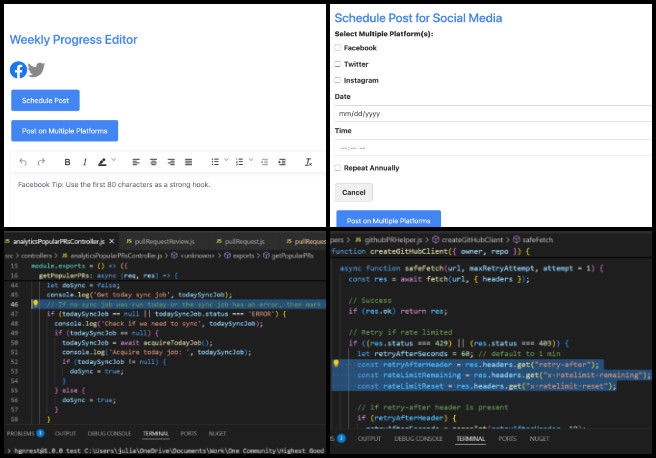
SOFTWARE PR REVIEW TEAM A-F
This week, the PR Review Team’s summary for members with names starting A–F, managed by Neeharika Kamireddy (Data Analyst), highlights their contributions to the Highest Good Network software. This platform forms the foundation for measuring our results in shaping highest good future building. Active team members included Abdelmounaim Lallouache (Software Developer), Aseem Deshmukh (Volunteer Software Engineer), Carl Bebli (Software Developer), and Chieh “Jerry” Jui Lee (Software Engineer). They supported the project by thoroughly reviewing all pull requests shared this week. Learn more about how the Highest Good Network tracks progress toward shaping highest good future building in the Highest Good Network open source hub. The collage below showcases a compilation of this team’s work.
SOFTWARE PR REVIEW TEAM G-N
This week, the PR Review Team’s summary for team members with names starting from G–N, covering their work on the Highest Good Network software, was managed by Govind Sajithkumar (Software Project Manager). The Highest Good Network software is a foundation for measuring our results of shaping highest good future building. This week’s active members of this team were: Kurtis Ivey (Full Stack Developer), Nahiyan Ahmed (Full Stack Software Developer), Nathan Hoffman (Software Engineer), and Naveen Kumar Reddy Kotturu (Software Engineer). They reviewed all the Highest Good Network PRs (Pull Requests) shared in this week’s update. Learn more about how the Highest Good Network measures shaping highest good future building by exploring the Highest Good Network open source hub. The collage below shows a compilation of the work from this team.
SOFTWARE PR REVIEW TEAM O-Z
This week, the PR Review Team’s summary for team members with names starting from O–Z, covering their work on the Highest Good Network software, was managed by Jaiwanth Reddy Adavalli (Software Project Manager). The Highest Good Network software is a foundation for measuring our results of shaping highest good future building. This week’s active members of this team were: Raahul Sallagunta (Software Engineer), Sourabh Bagde (Software Developer), Srushti Patel (Software Developer), Sundar Machani (Software Engineer), Suraj Rao (Software Engineer), Swetha Rachakonda (Software Engineer), Vishnu Kumar (Software Engineer), and Yiyun Tan (Software Engineer). They reviewed all the Highest Good Network PRs (Pull Requests) shared in this week’s update. Learn more about how the Highest Good Network measures shaping highest good future building by exploring the Highest Good Network open source hub. The collage below shows a compilation of the work from this team.
AND WE PRODUCED THIS WEEKLY UPDATES BLOG – CLICK HERE TO SUBSCRIBE
FOLLOW ONE COMMUNITY’S PROGRESS (click icons for our pages)
INVESTOR PAGES
GET INVOLVED
DONATE | WAYS ANYONE CAN HELP | MEMBERSHIP
CLICK HERE FOR ALL PAST UPDATES
 One Community
One Community